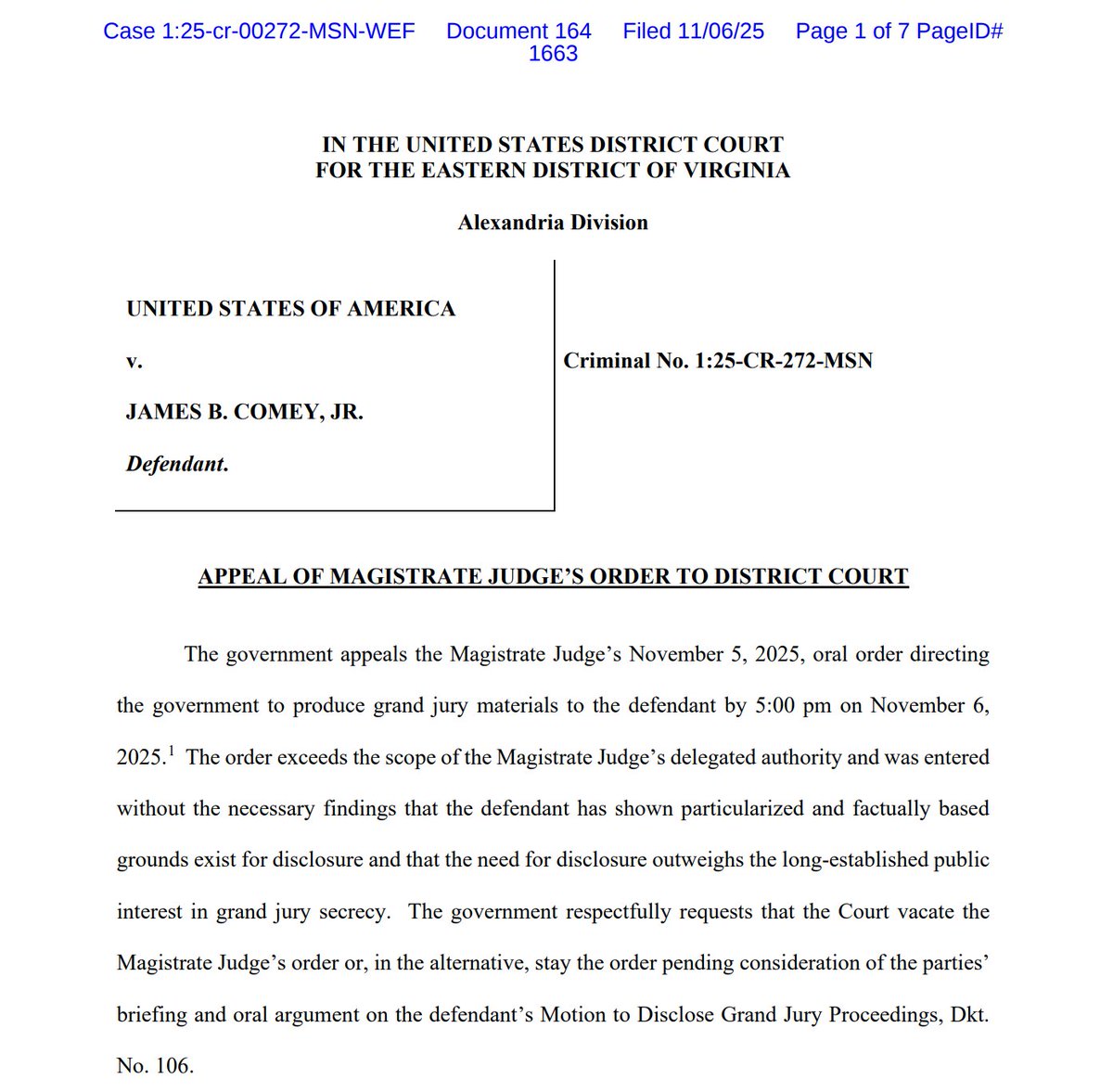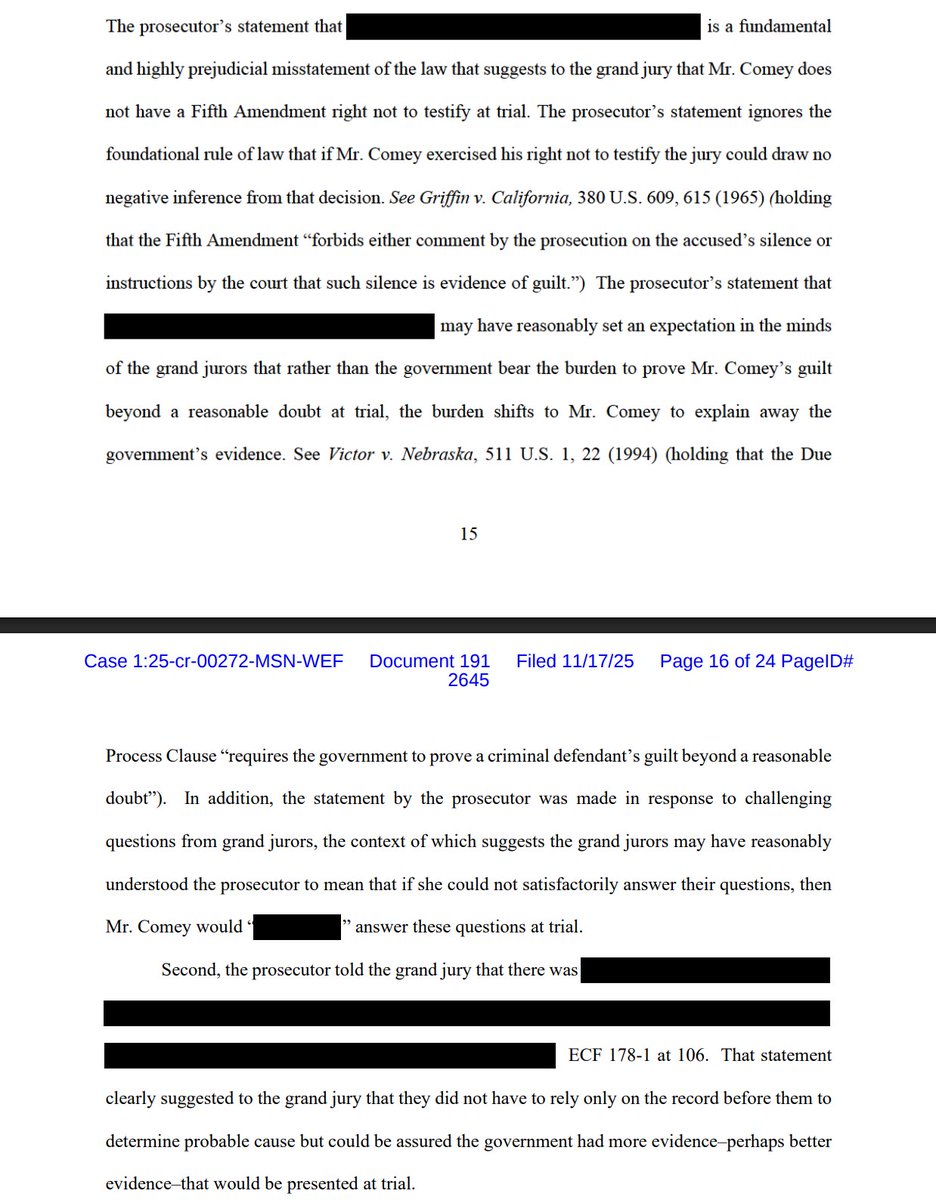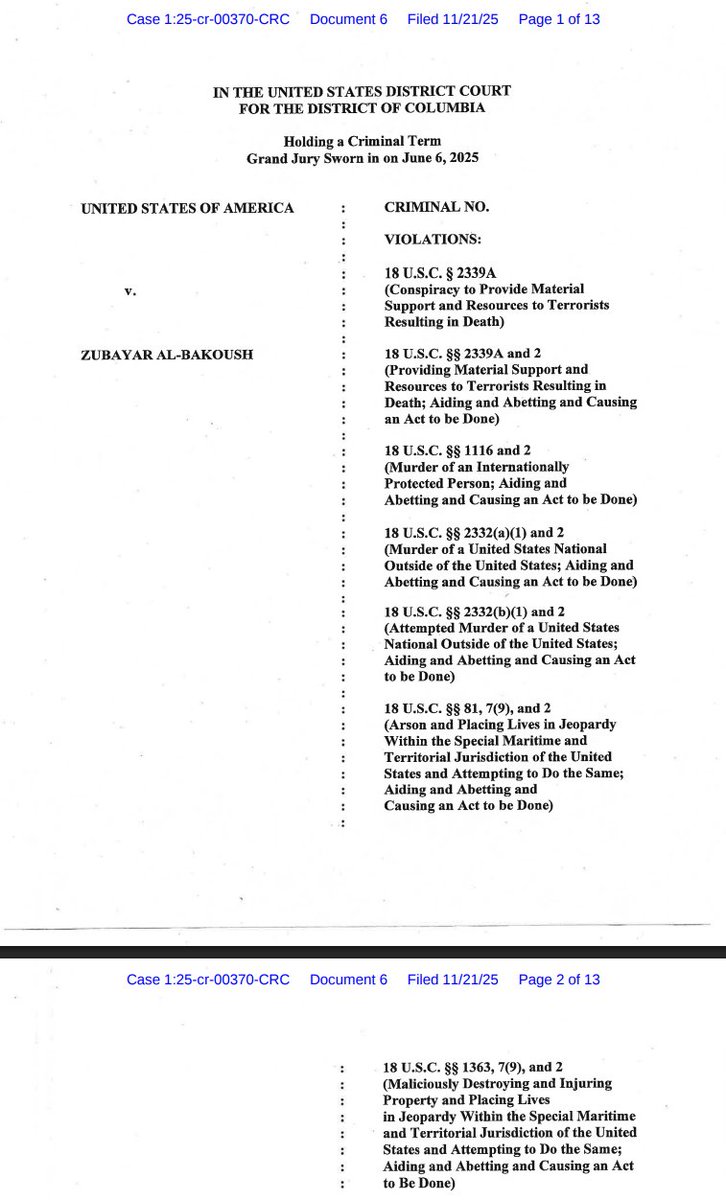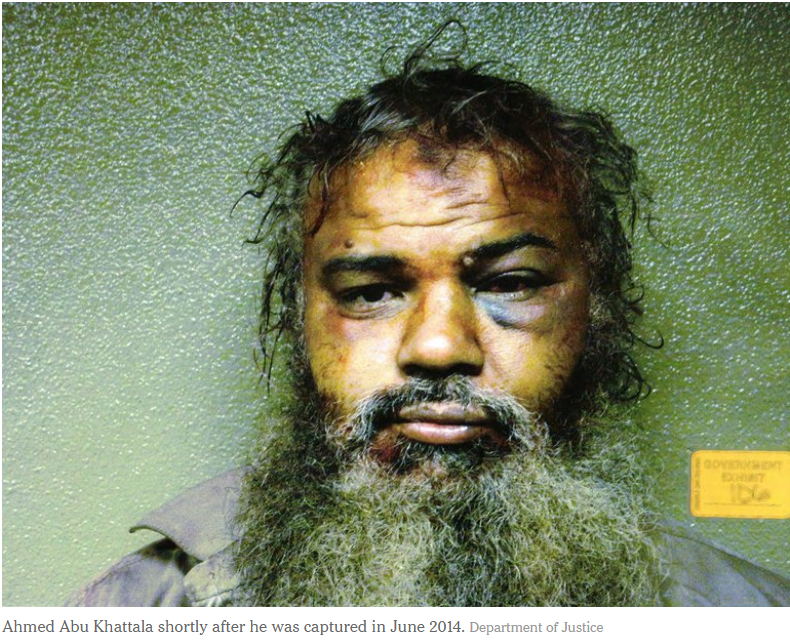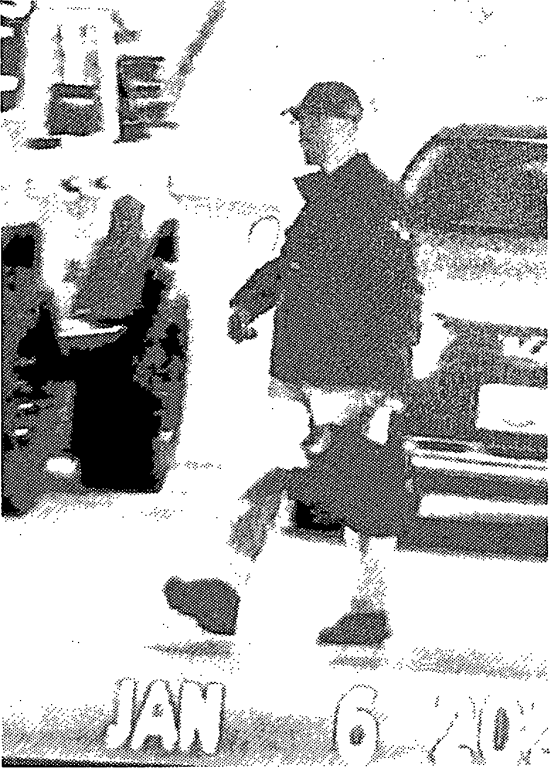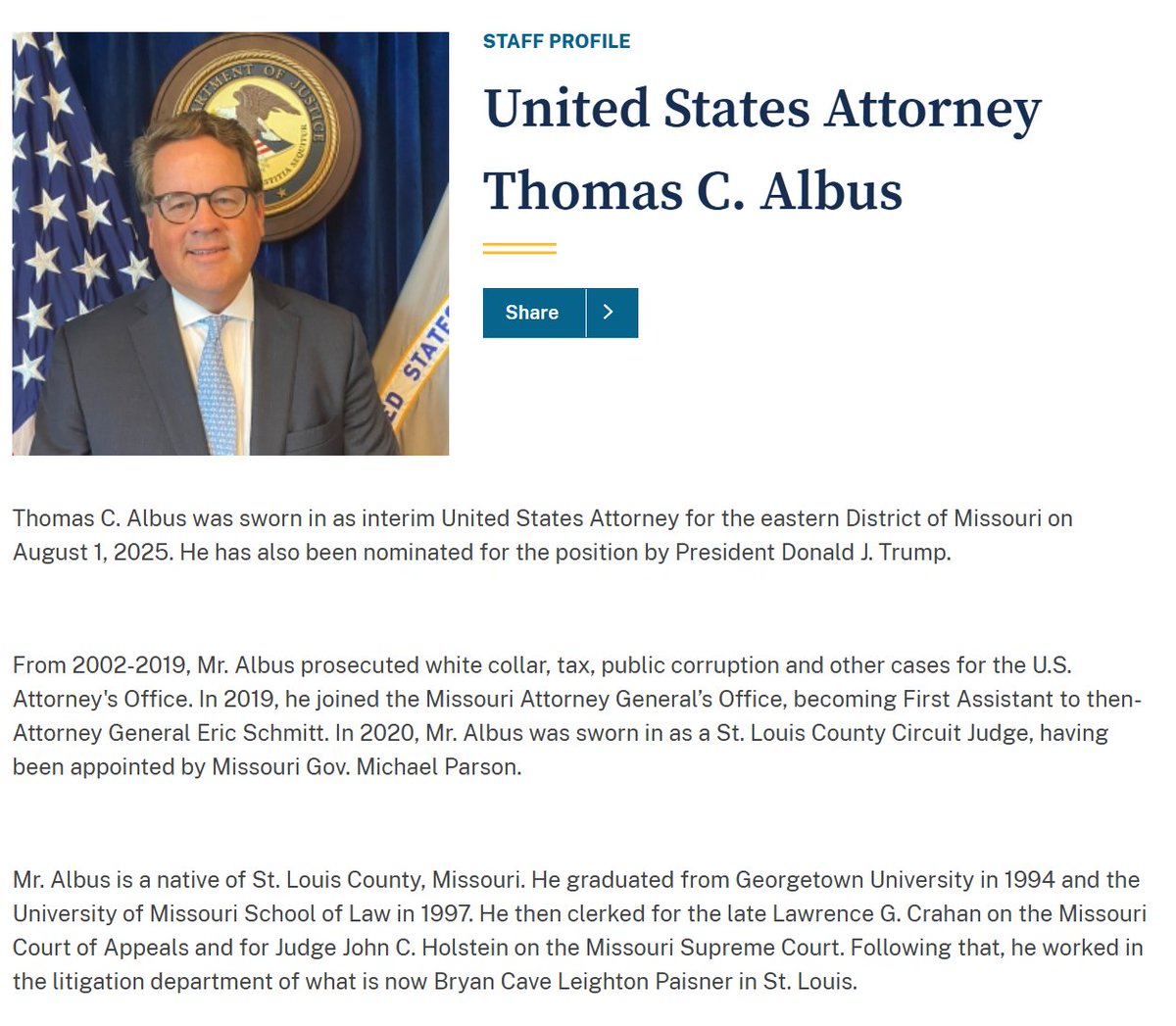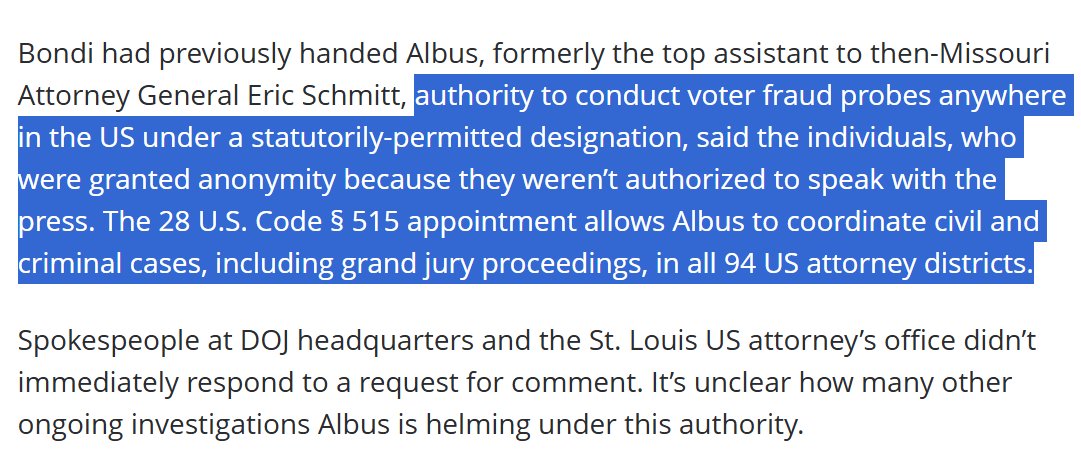🧵United States v. Comey
**HUGE WIN FOR COMEY**
Magistrate Judge Fitzpatrick once again finds that disclosure of grand jury materials is warranted in this case.
Orders DOJ to turn ALL grand jury materials over to the defense by 3pm today and all audio recordings by 5pm today.
**HUGE WIN FOR COMEY**
Magistrate Judge Fitzpatrick once again finds that disclosure of grand jury materials is warranted in this case.
Orders DOJ to turn ALL grand jury materials over to the defense by 3pm today and all audio recordings by 5pm today.

What got us here is a bit complicated, but I have covered it in several threads and videos over the past few weeks and am not at all surprised by this order.
If you want to avoid reactionary takes and understand what is going on in United States v. Comey—I'm your guy. : )
If you want to avoid reactionary takes and understand what is going on in United States v. Comey—I'm your guy. : )
There are three judges involved in the Comey case.
Nachmanoff is the district judge handling the criminal case. He has brought in two other judges to handle sensitive issues. This was done in accordance with the rules.
Nachmanoff is the district judge handling the criminal case. He has brought in two other judges to handle sensitive issues. This was done in accordance with the rules.
Magistrate Judge Fitzpatrick is handling the issue of the proposed filter team and attorney-client privileged communications seized during Arctic Haze. Because there is reason to believe that some of that privileged info was conveyed to the grand jury, he is also examining the grand jury proceedings.
Senior District Judge Currie is handling the appointment of Halligan, because the lawfulness of that appointment has been challenged by Comey (and by Leticia James). Because Halligan presented evidence and testimony to the grand jury, Currie is ALSO examining the grand jury proceedings.
There are at this time TWO distinct threats to this case:
One- Irregularities with the grand jury process. Specifically, the grand jury potentially being exposed to attorney-client privileged information.
Two- Halligan being the ONLY prosecutor to present to the grand jury.
One- Irregularities with the grand jury process. Specifically, the grand jury potentially being exposed to attorney-client privileged information.
Two- Halligan being the ONLY prosecutor to present to the grand jury.
If there was a "spill" of privileged information to the grand jury, it could be solid grounds for dismissal.
If Halligan is found to be unlawfully appointed, that could be grounds for dismissal.
If Halligan is found to be unlawfully appointed, that could be grounds for dismissal.
DOJ was already ordered to turn the grand jury materials over to the defense back on Nov 5.
I covered the development in this thread and also provided key background information.
I covered the development in this thread and also provided key background information.
https://x.com/realjusthuman/status/1986579166477668729
And in this video
Judge Nachmanoff, who is the district judge handling the criminal case against Comey, found that judge Fitzpatrick was within his delegated authority to issue such an order and remanded the issue back to Fitzpatrick, who scheduled a hearing on the issue.
I covered filings made ahead of that hearing in this thread
https://x.com/realjusthuman/status/1987997146453336512
And in this video
On my most recent podcast episode, I spent the first hour going through the most recent filings in this case that concern the filter team (Fitzpatrick), the grand jury proceedings (Fitzpatrick & Currie), as well as the Halligan appointment (Currie).
https://x.com/realjusthuman/status/1990212539213300034
Today, Fitzpatrick issued an order and filed this opinion, which DOES NOT bode well for the case against James Comey.
"the Court finds the record in this case requires the full disclosure of grand jury materials. In so finding, the Court recognizes this is an extraordinary remedy, but given the factually based challenges the defense has raised to the government’s conduct and the prospect that government misconduct may have tainted the grand jury proceedings, disclosure of grand jury materials under these unique circumstances is necessary to fully protect the rights of the accused."
"the Court finds the record in this case requires the full disclosure of grand jury materials. In so finding, the Court recognizes this is an extraordinary remedy, but given the factually based challenges the defense has raised to the government’s conduct and the prospect that government misconduct may have tainted the grand jury proceedings, disclosure of grand jury materials under these unique circumstances is necessary to fully protect the rights of the accused."
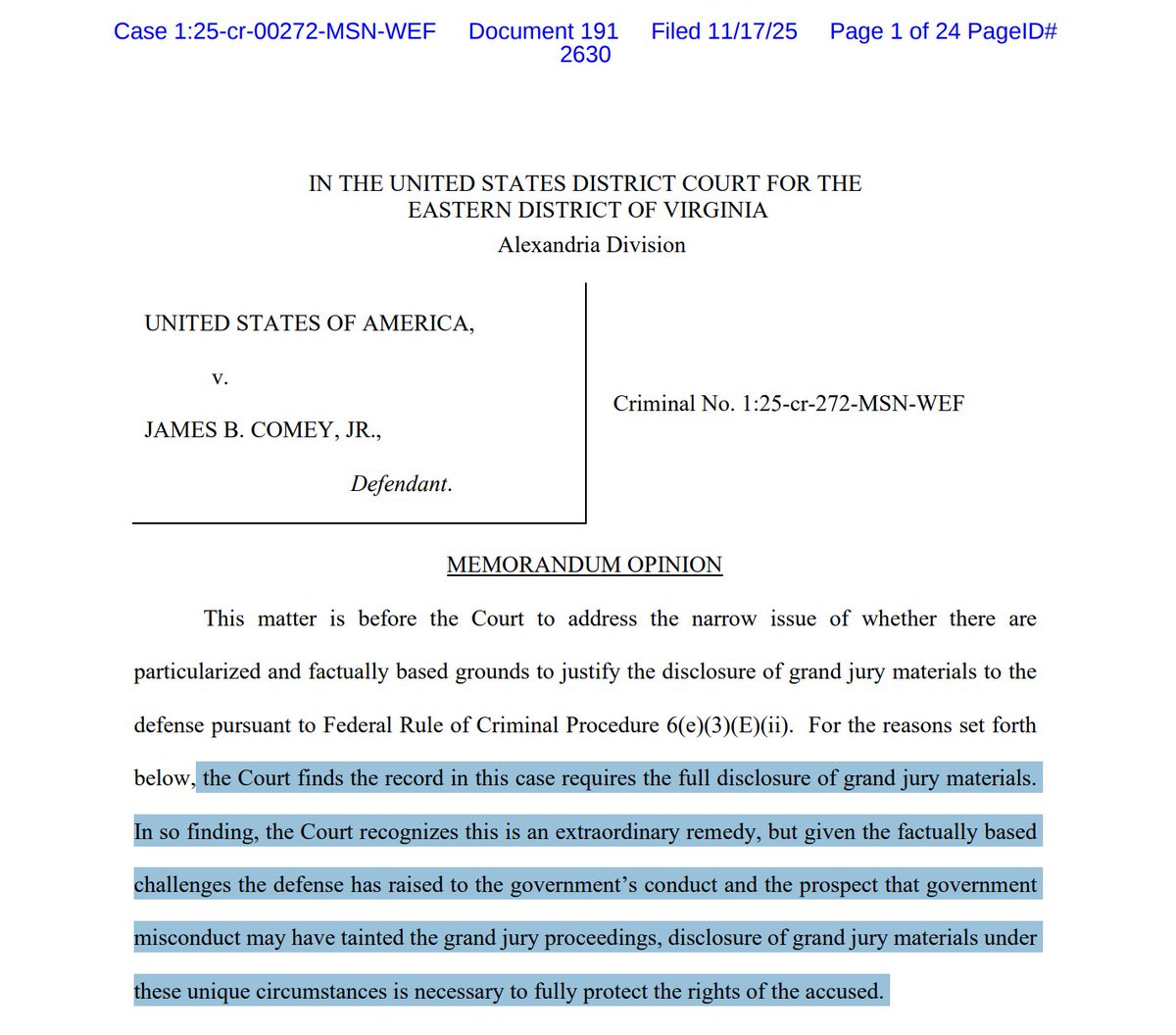
In the filing, after giving procedural background and the history of Arctic Haze, Fitzgerald tells us of the four search warrants issued against Daniel Richman (Person 3) during that media leak investigation:
"The record reflects that in 2019 and 2020, the government took modest—and as it turned out ineffective—steps to identify and isolate potentially privileged information contained in the materials seized pursuant to the Richman Warrants."
"The record reflects that in 2019 and 2020, the government took modest—and as it turned out ineffective—steps to identify and isolate potentially privileged information contained in the materials seized pursuant to the Richman Warrants."
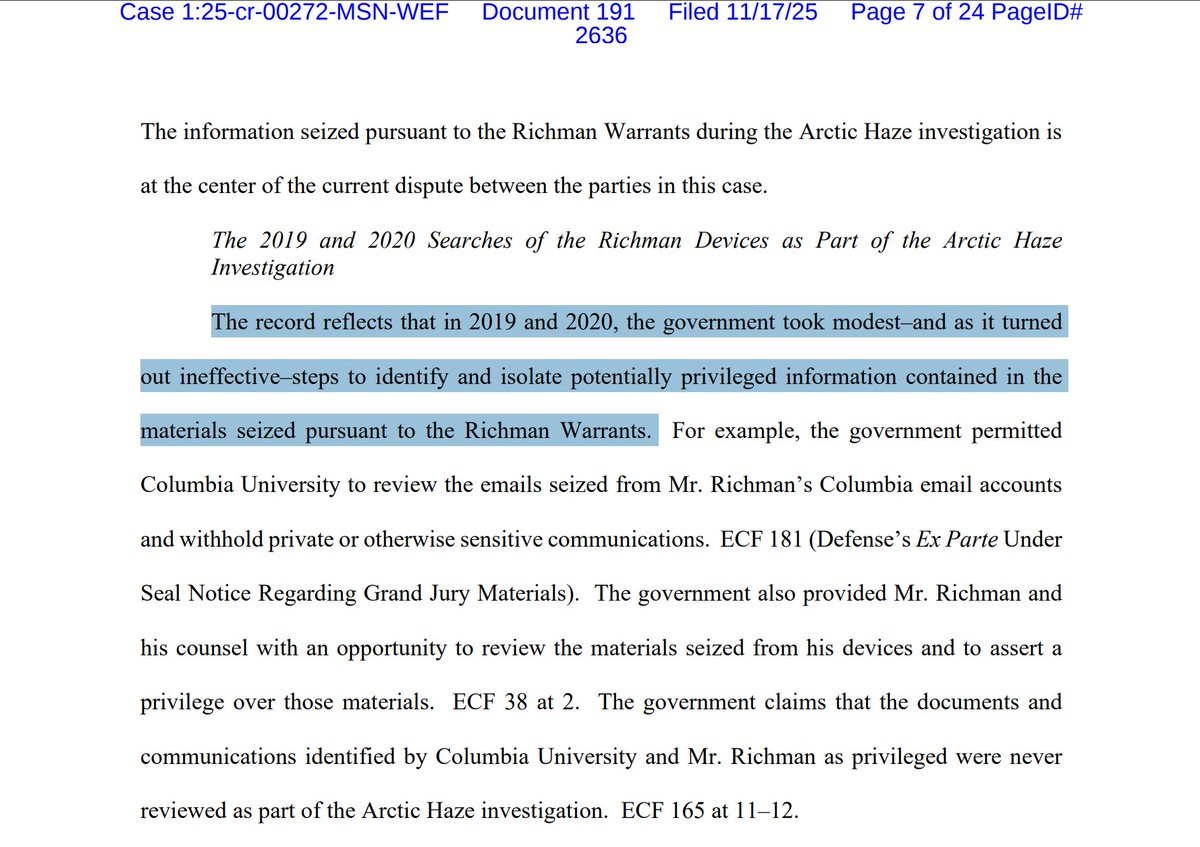
"the government never engaged Mr. Comey in this process even though it knew that Mr. Richman represented Mr. Comey as his attorney as of May 9, 2017"
Hence, the rush to get a filter team protocol implemented last month to deal with this privileged info.
Hence, the rush to get a filter team protocol implemented last month to deal with this privileged info.
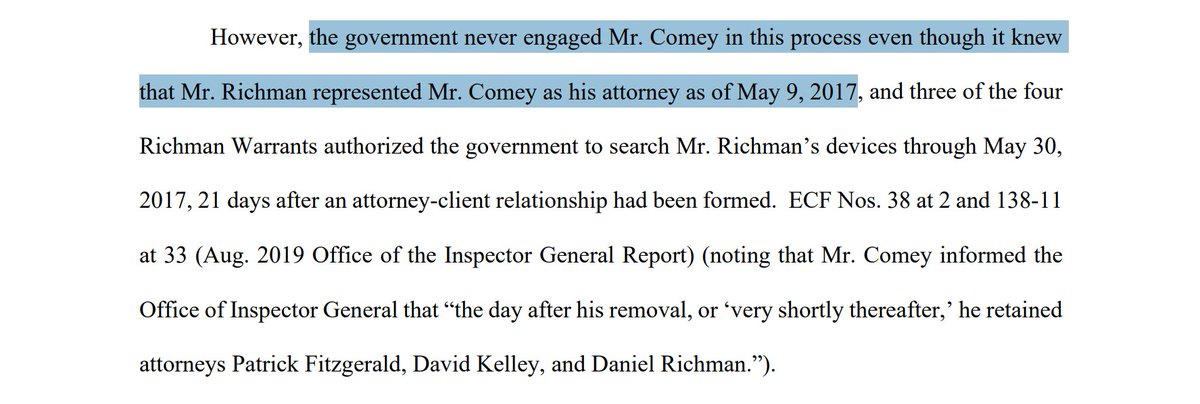
Arctic Haze investigators collected data from Richman's iCloud account "well outside the scope of the warrant and well past the date on which Mr. richman was retained as Mr. Comey's attorney." 
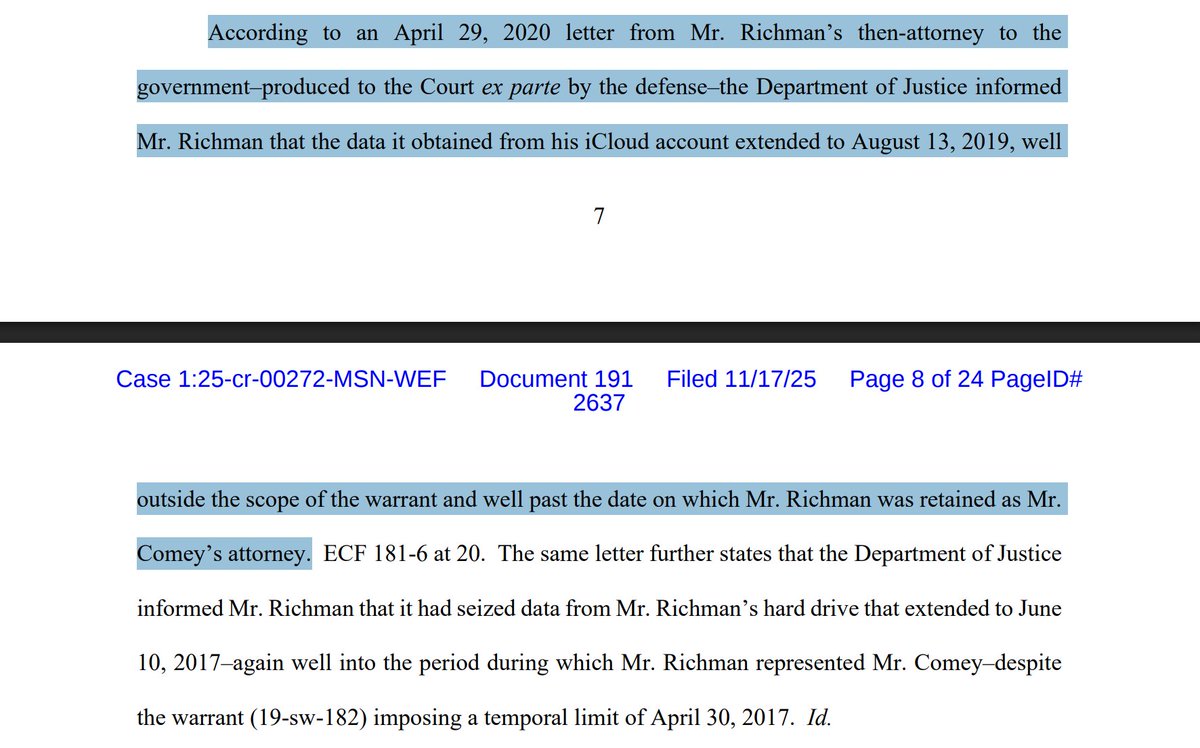
"At the time the Richman Warrants were executed, the government was aware not only that Mr. Richman represented Mr. Comey, but also that he maintained ongoing attorney-client relationships with other individuals"
Richman's resignation documents noted this.
Richman's resignation documents noted this.
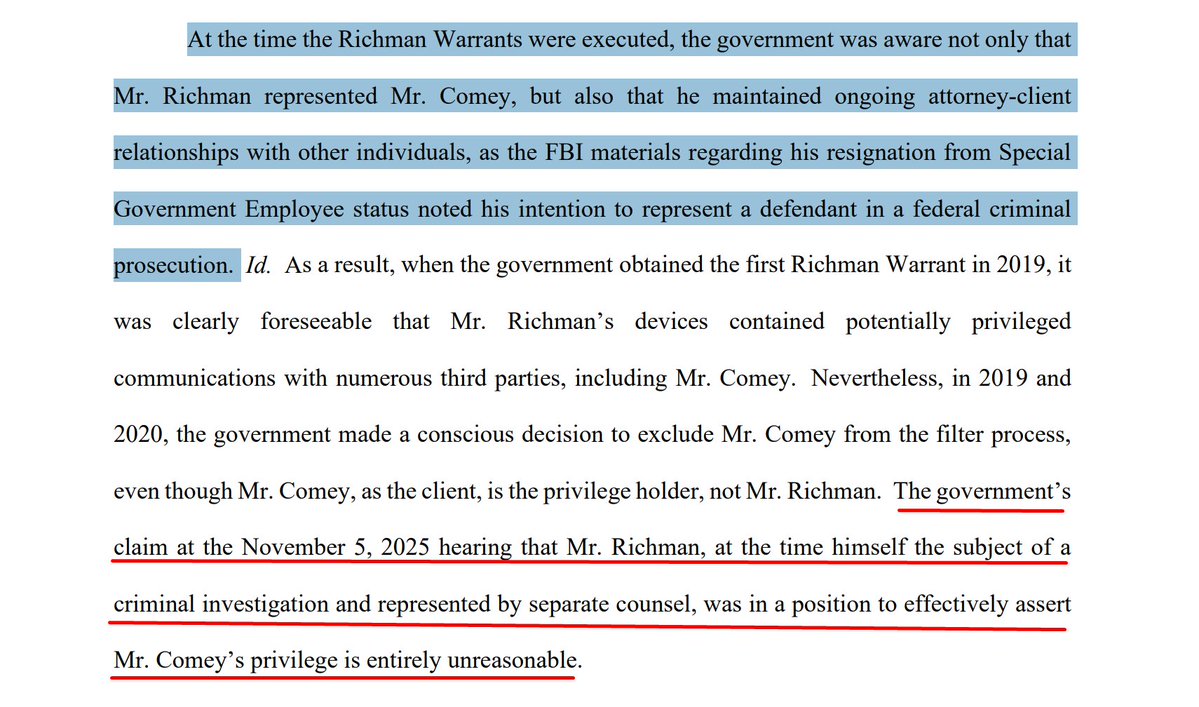
Possible Fourth Amendment violations.
The search warrants were for evidence of specific crimes:
18 U.S.C. § 641 (Theft and Conversion of Stolen Government Property)
18 U.S.C. § 793 (Unlawful Gathering or Transmission of National Defense Information)
The search warrants were for evidence of specific crimes:
18 U.S.C. § 641 (Theft and Conversion of Stolen Government Property)
18 U.S.C. § 793 (Unlawful Gathering or Transmission of National Defense Information)
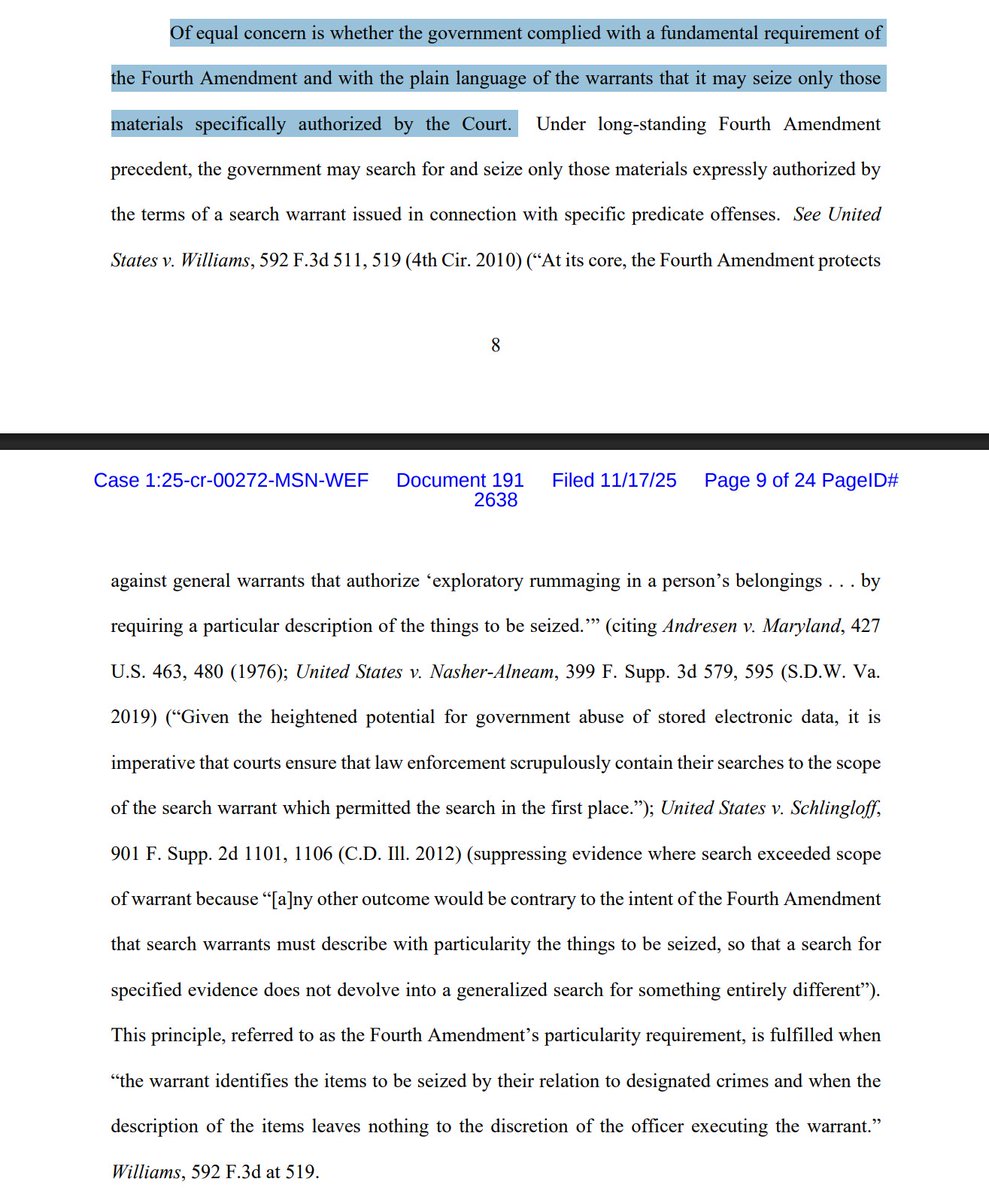
"There is nothing in the record to suggest the government made any attempt to identify what documents, communications, or other materials seized from Mr. Richman constituted evidence of violations of 18 U.S.C. § 641 and § 793."
The crimes alleged against Comey in this case.
The crimes alleged against Comey in this case.
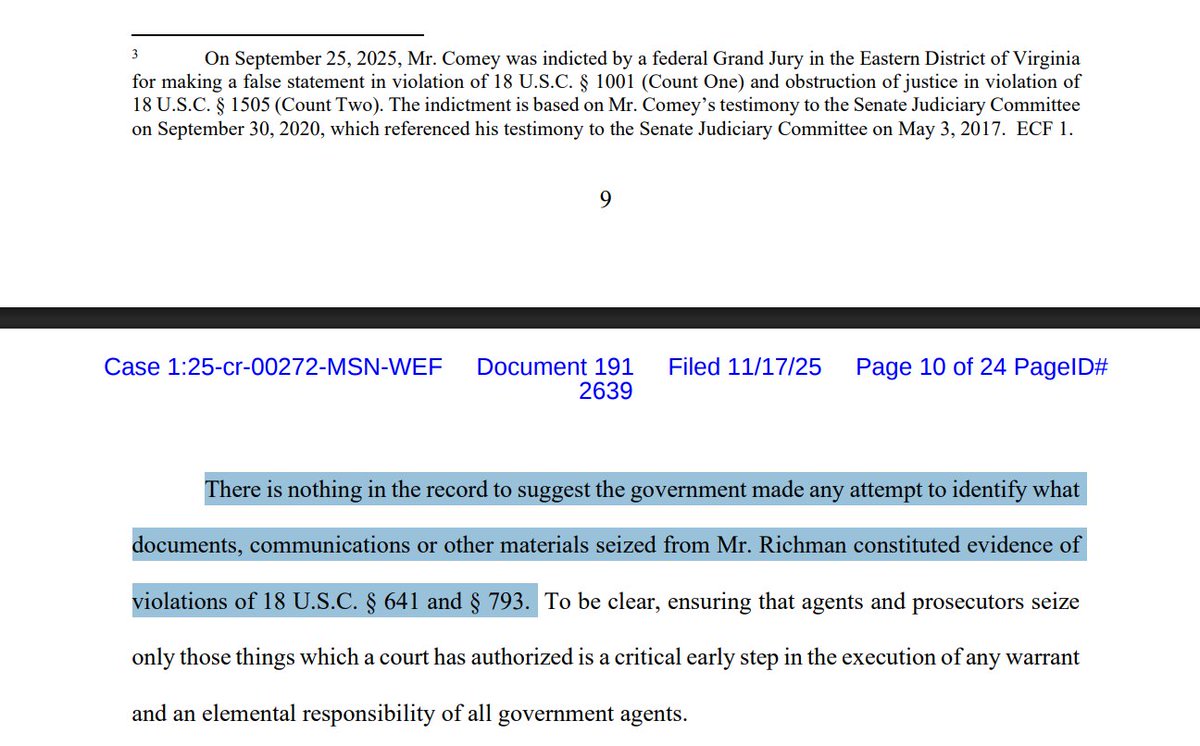
"When the undersigned questioned the Assistant United States Attorney currently assigned to this case at the November 5, 2025 hearing, as to how and whether a set of materials responsive to the Richman Warrants was identified and separated from non-responsive materials, he simply said he did not know."
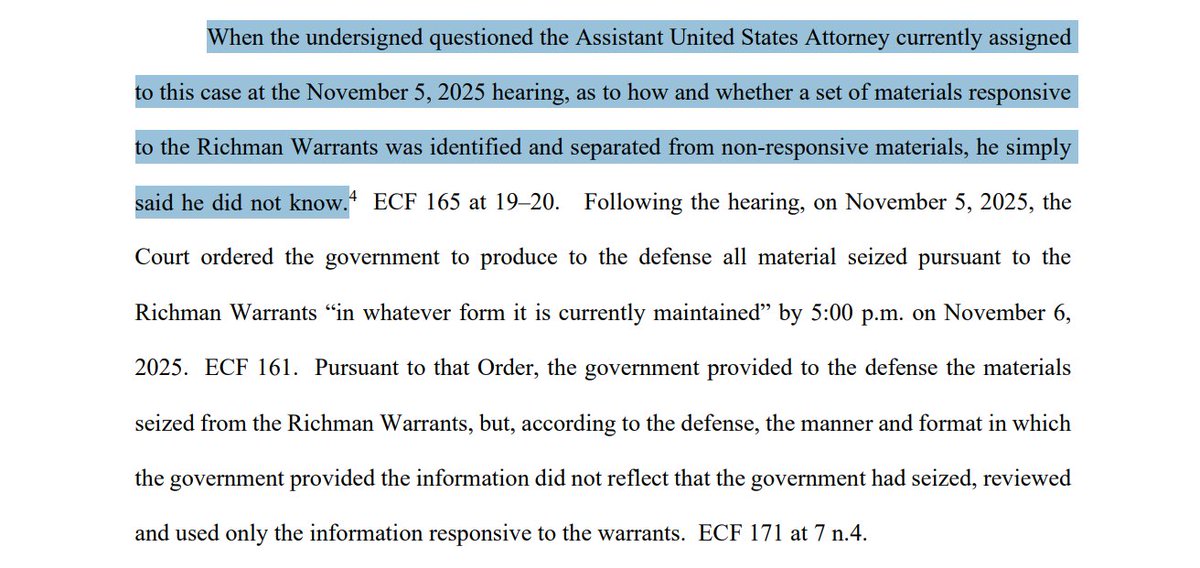
"This potential failure by the government is even more concerning because" one warrant specifically directed them to review and identify responsive information in it and seal any information that "does not fall within" scope. 
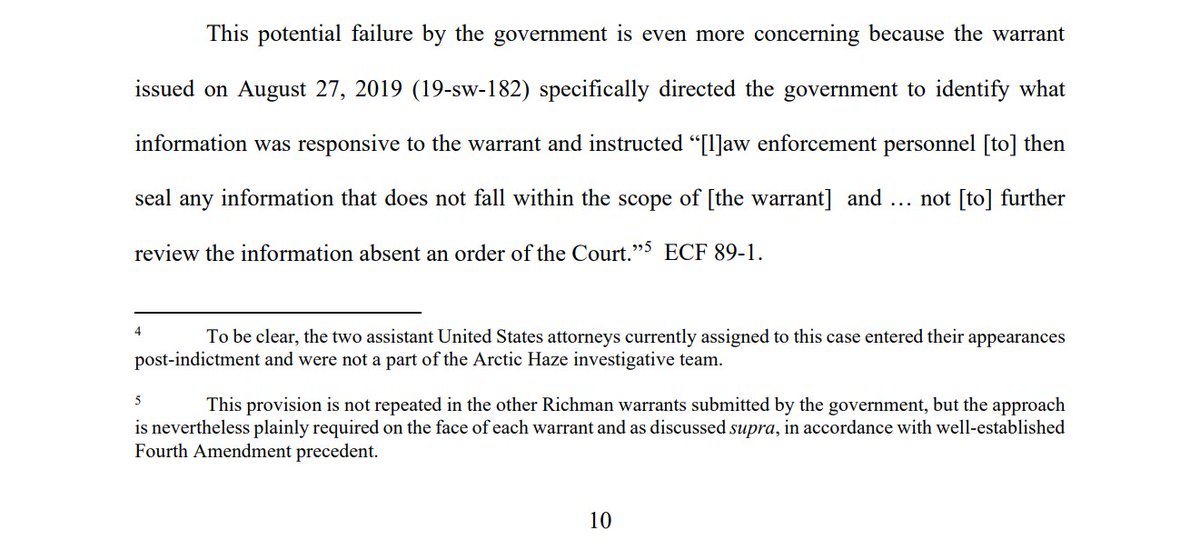
"The government appears to have conflated its obligation to protect privileged information–an obligation it approached casually at best in this case–with its duty to seize only those materials authorized by the Court."
Yikes.
Yikes.

"Inexplicably, the government elected not to seek a new warrant for the 2025 search, even though the 2025 investigation was focused on a different person, was exploring a fundamentally different legal theory, and was predicated on an entirely different set of criminal offenses." 
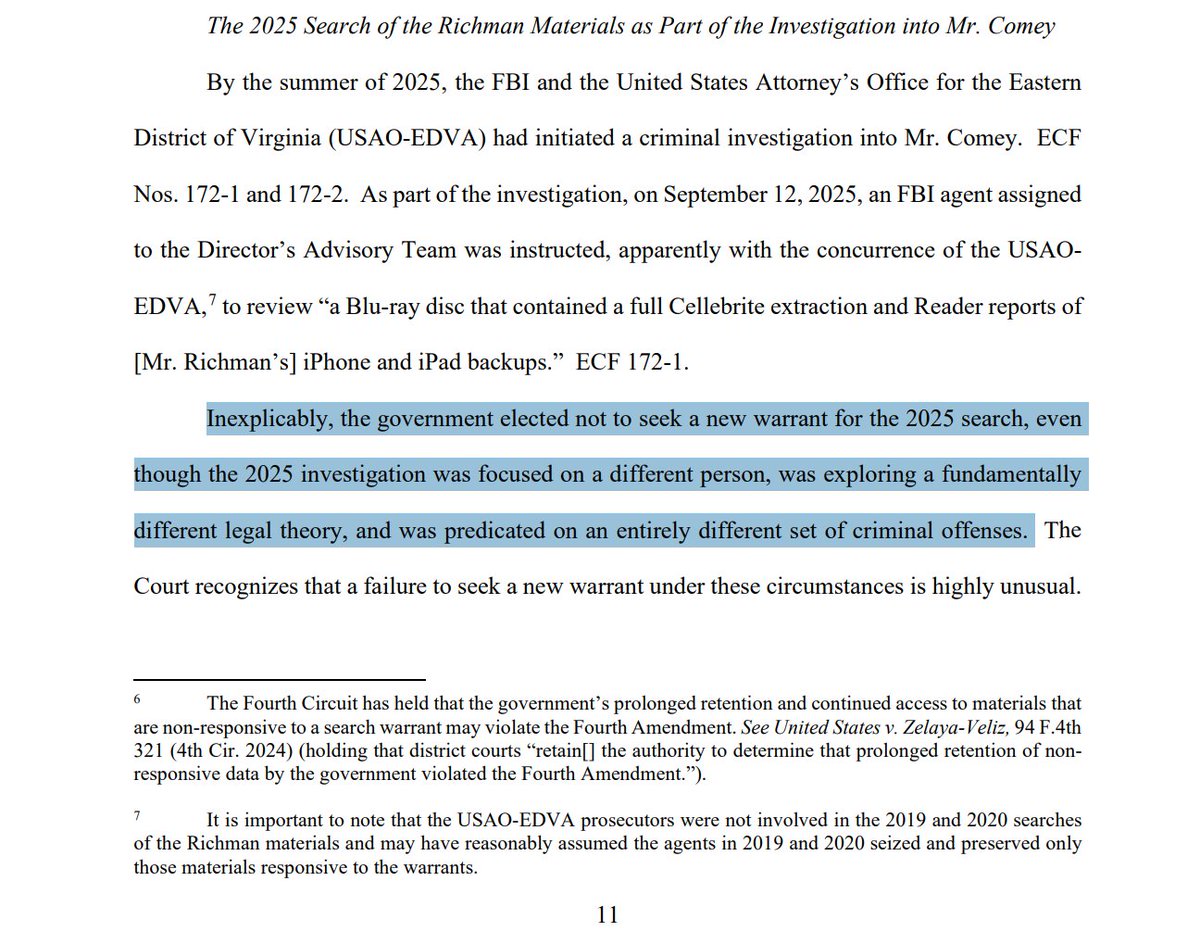
They chose expediency over carefull investigative steps because they needed to indict before the SOL ran out. 
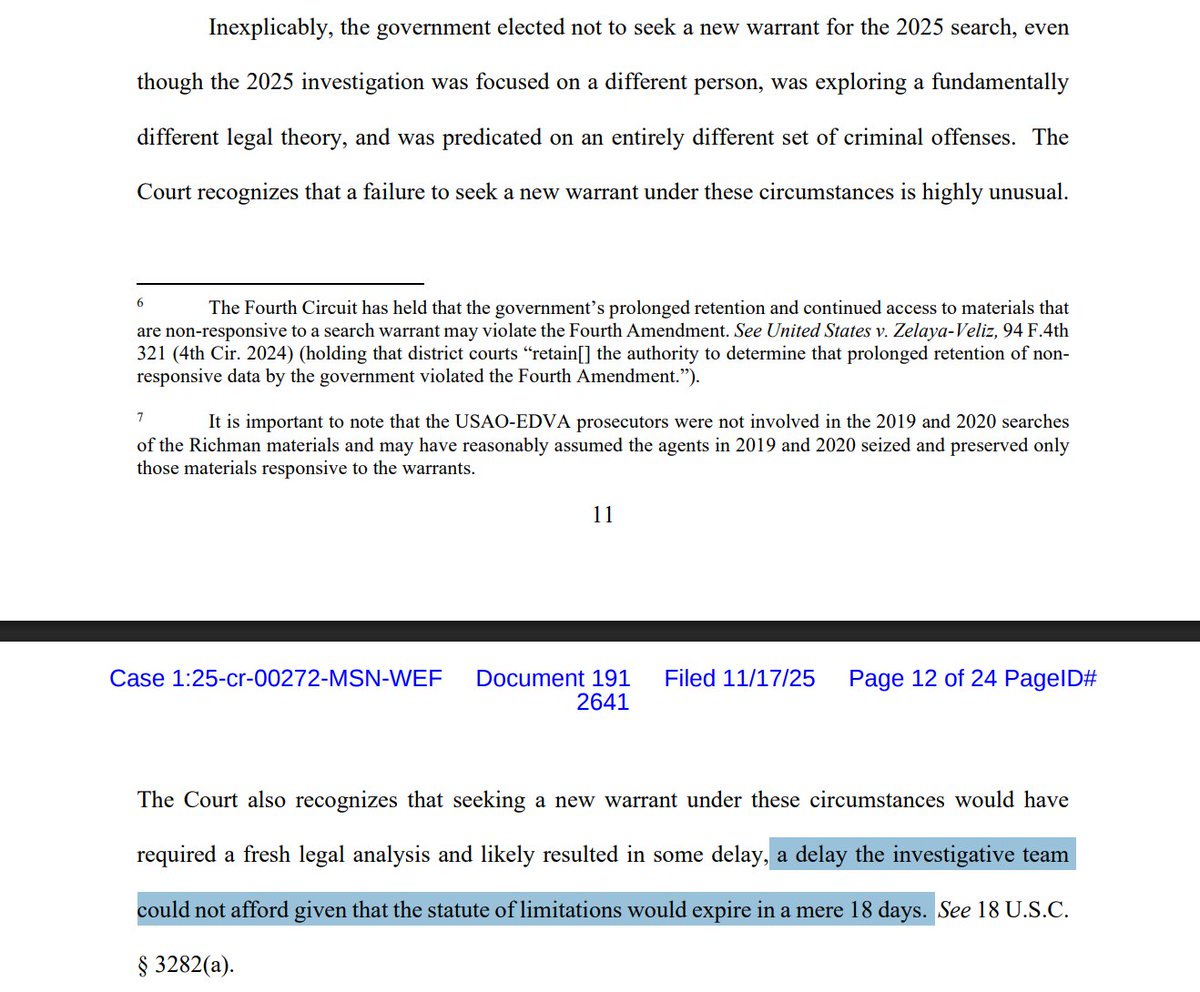
"If a new warrant had been sought by the government and issued by the Court, the Fourth Amendment would have required it to be narrowly tailored, authorizing access only to materials within a limited time frame and relevant to the new offenses under investigation.
In addition, any new warrant would have imposed strict procedural safeguards to ensure privileged information was not reviewed by the prosecution team."
In addition, any new warrant would have imposed strict procedural safeguards to ensure privileged information was not reviewed by the prosecution team."
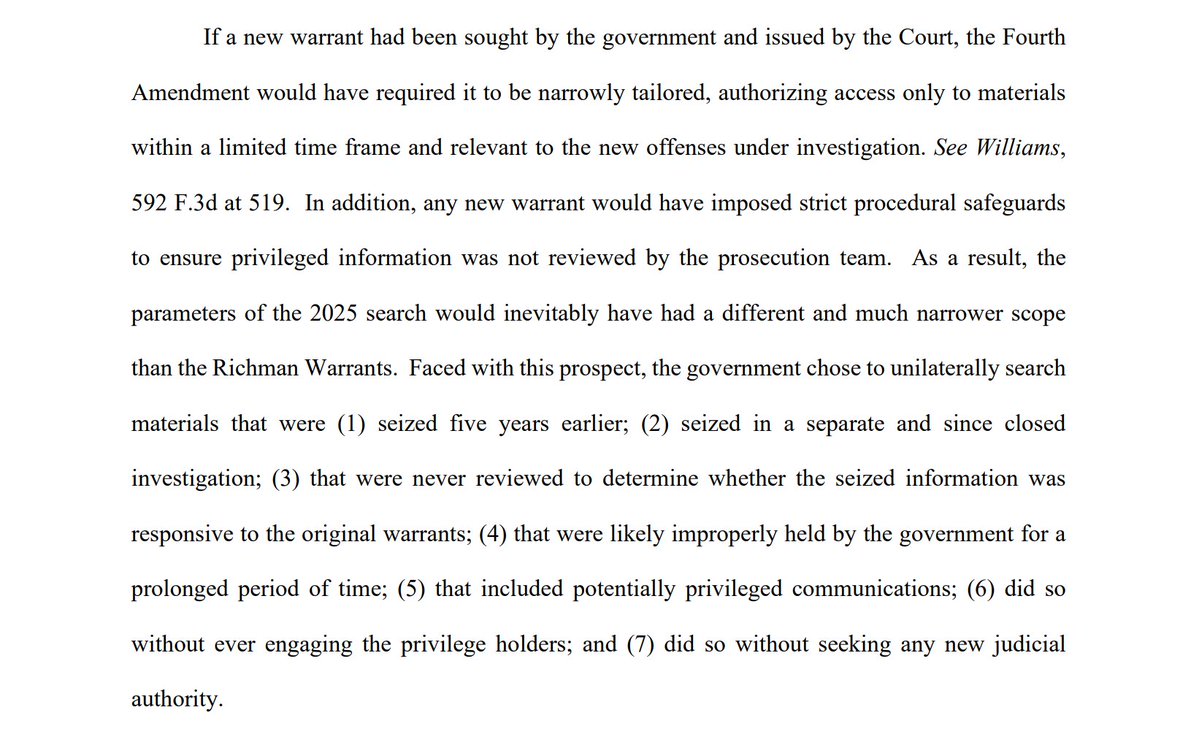
But they didn't go about this the right way and made some significant missteps.
Including the lead FBI case agent, the ONLY witness to testify to the grand jury, being exposed to attorney-client privileged information.
"The government’s decision to allow an agent who was exposed to potentially privileged information to testify before a grand jury is highly irregular and a radical departure from past DOJ practice."

Including the lead FBI case agent, the ONLY witness to testify to the grand jury, being exposed to attorney-client privileged information.
"The government’s decision to allow an agent who was exposed to potentially privileged information to testify before a grand jury is highly irregular and a radical departure from past DOJ practice."
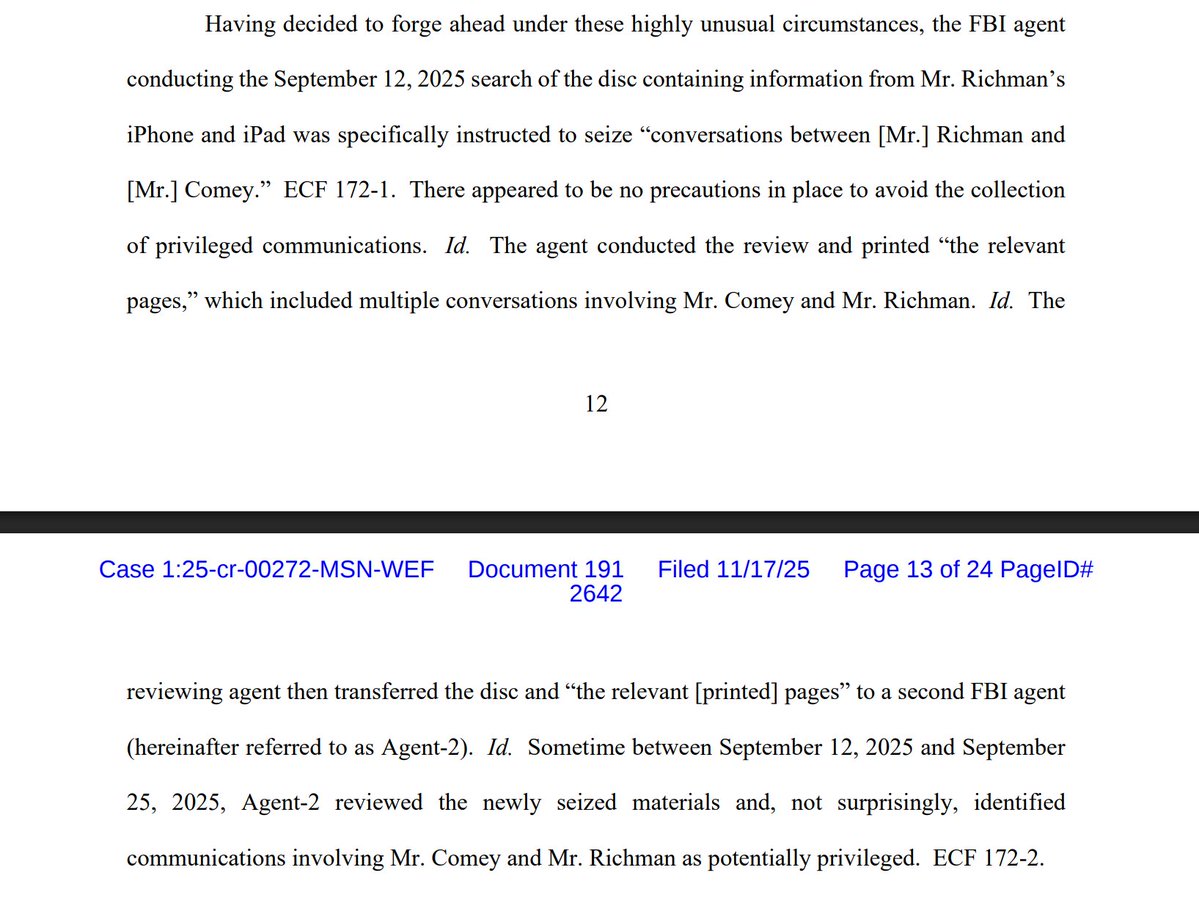
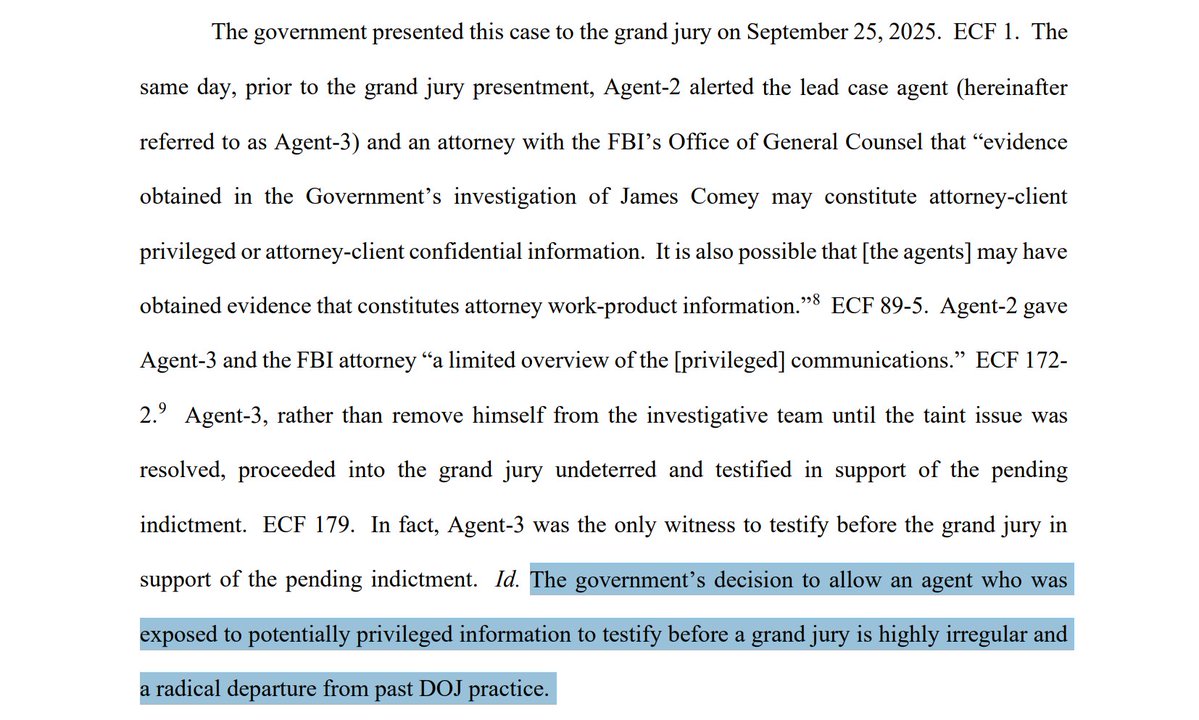
"Only after the government had reviewed the materials seized pursuant to the 2019 and 2020 search warrants, only after FBI agents had personally identified potentially privileged materials, and only after the government obtained an indictment on September 25, 2025, did it seek court approval of a filter protocol for materials the FBI had already reviewed."
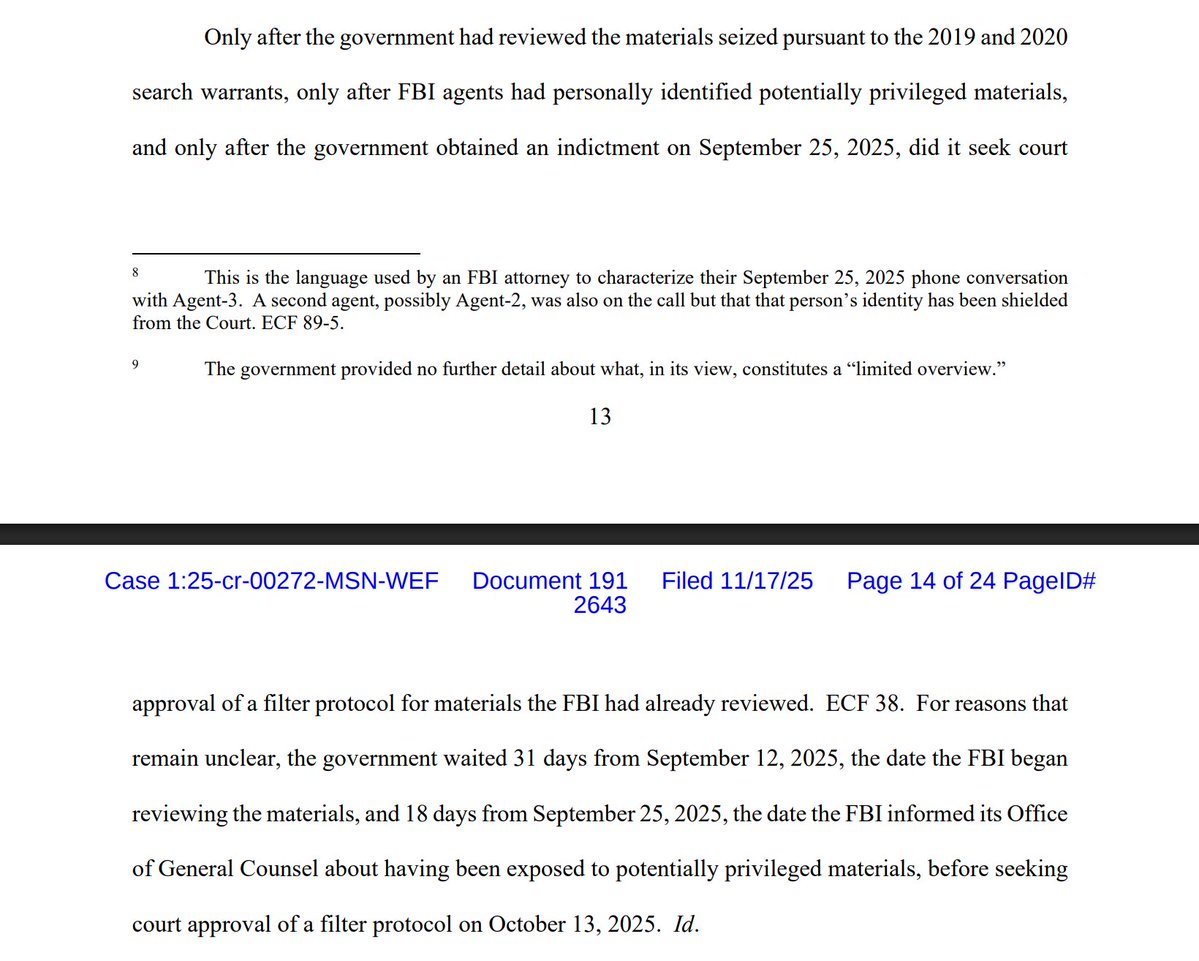
Folks, they waited until the very day (Oct 13) that Rule 16 discovery was due in this case to motion for the filter team protocol.
"While it is true that the undersigned did not immediately recognize any overtly privileged communications [being conveyed to the grand jury], it is equally true that the materials seized from the Richman Warrants were the cornerstone of the government’s grand jury presentation." 
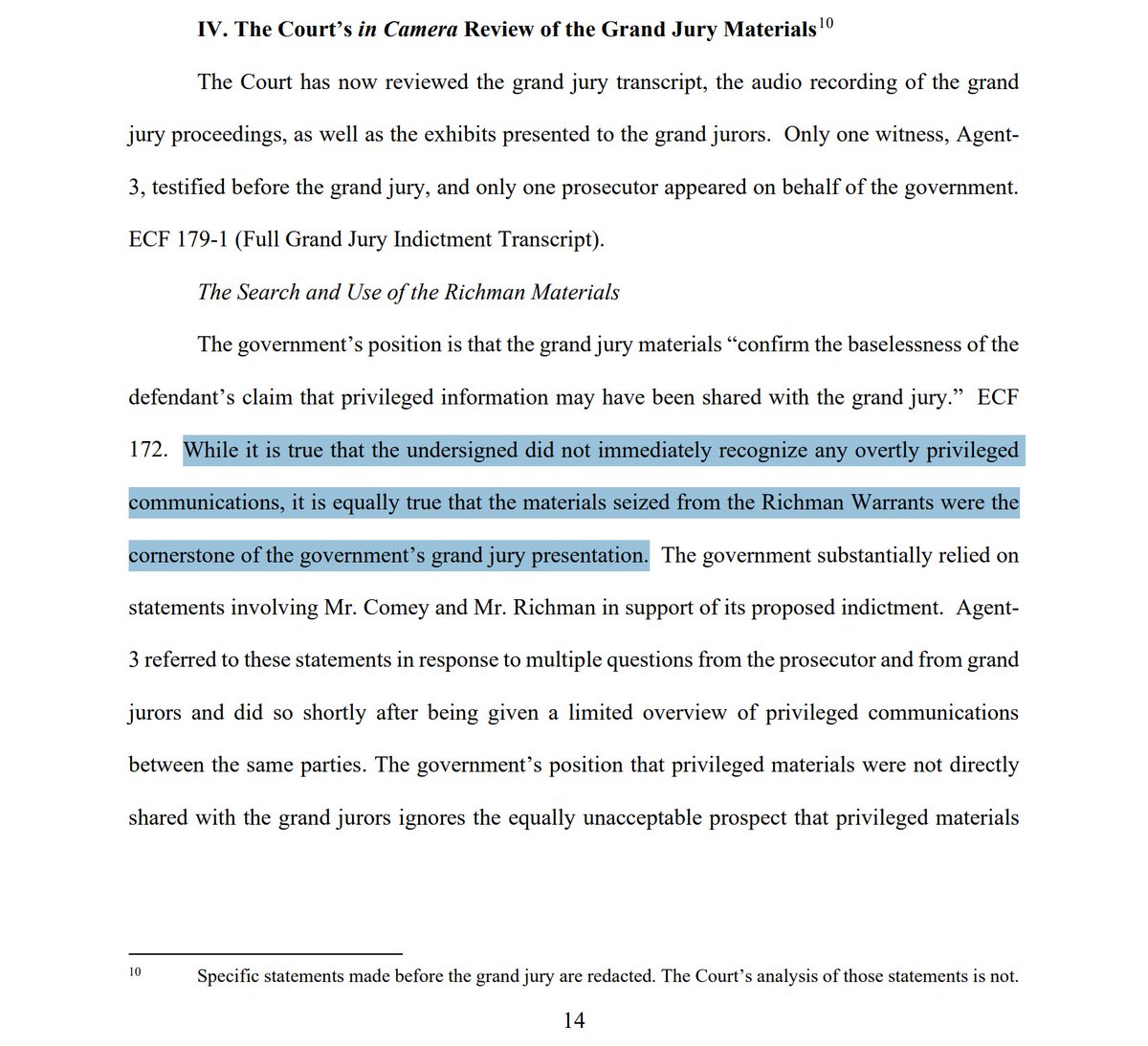
"The government substantially relied on statements involving Mr. Comey and Mr. Richman in support of its proposed indictment."
The lead case agent, who was exposed to the privileged communications shortly before testifying to the grand jurors and was subsequently pulled off the case by OLC,
"referred to these statements in response to multiple questions from the prosecutor and from grand jurors"
The lead case agent, who was exposed to the privileged communications shortly before testifying to the grand jurors and was subsequently pulled off the case by OLC,
"referred to these statements in response to multiple questions from the prosecutor and from grand jurors"
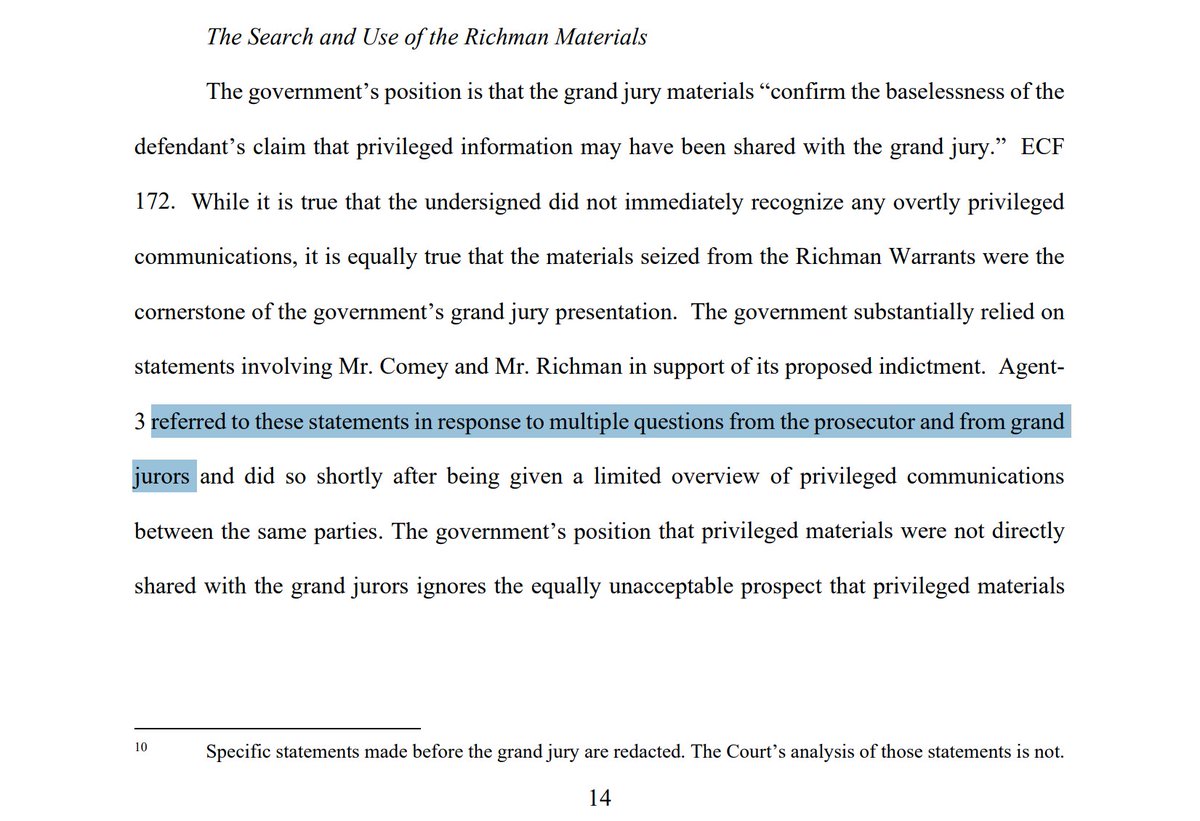
"The government’s position that privileged materials were not directly shared with the grand jurors ignores the equally unacceptable prospect that privileged materials were used to shape the government's presentation and therefore improperly inform the grand jurors' deliberations."
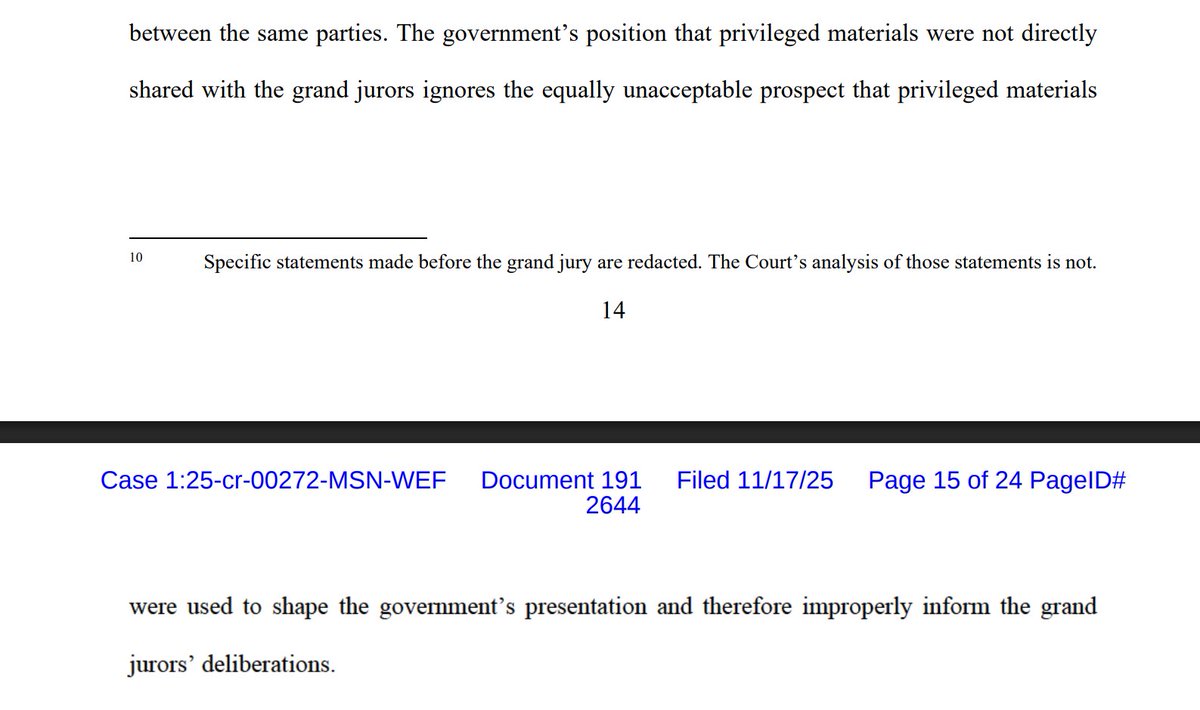
Oh... it somehow gets even worse.
"the Court has identified two statements by the prosecutor to the grand jurors that on their face appear to be fundamental misstatements of the law and could compromise the integrity of the grand jury process."
"the Court has identified two statements by the prosecutor to the grand jurors that on their face appear to be fundamental misstatements of the law and could compromise the integrity of the grand jury process."
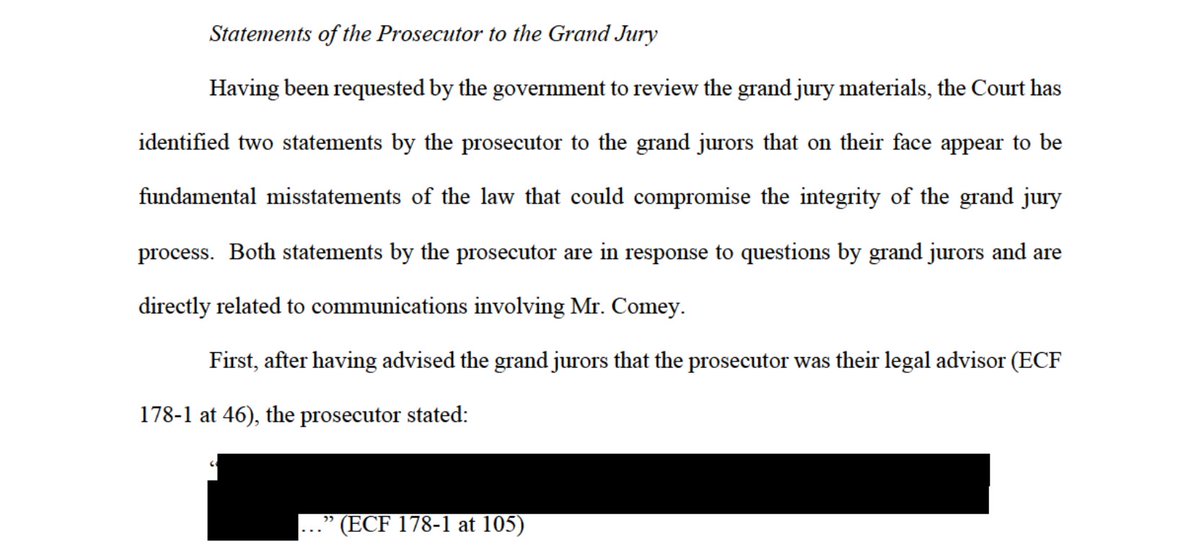
Umm... it gets worse, y'all.
"The second indictment was a new indictment and therefore the undersigned concluded after reviewing the grand jury transcript that the prosecutor would have presented the second indictment to the grand jury for consideration before it was returned in open court. It now appears that may not have happened."
"The second indictment was a new indictment and therefore the undersigned concluded after reviewing the grand jury transcript that the prosecutor would have presented the second indictment to the grand jury for consideration before it was returned in open court. It now appears that may not have happened."
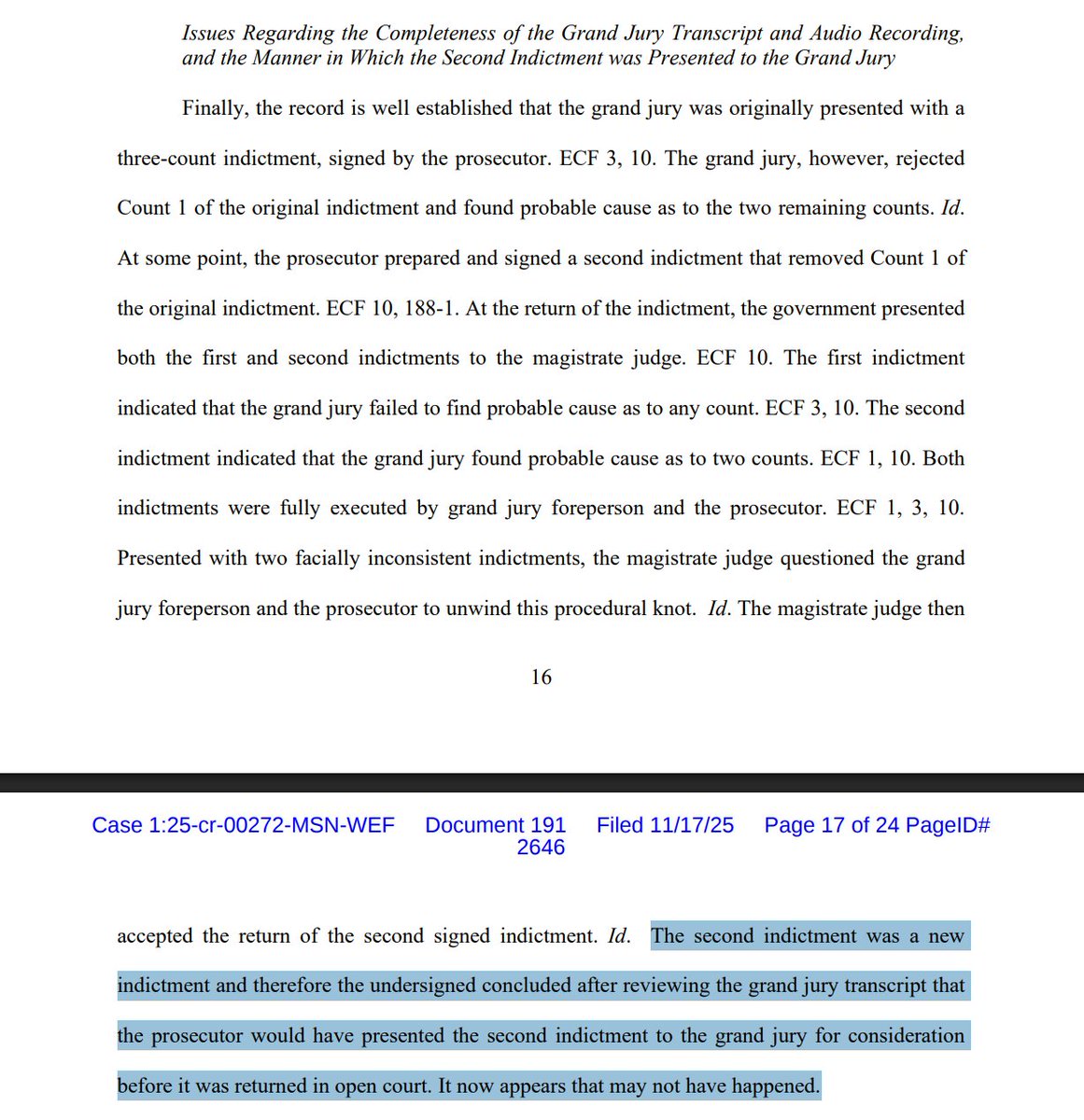
"The short time span between the moment the prosecutor learned that the grand jury rejected one count in the original indictment and the time the prosecutor appeared in court to return the second indictment could not have been sufficient to draft the second indictment, sign the second indictment, present it to the grand jury, provide legal instructions to the grand jury, and give them an opportunity to deliberate and render a decision on the new indictment."
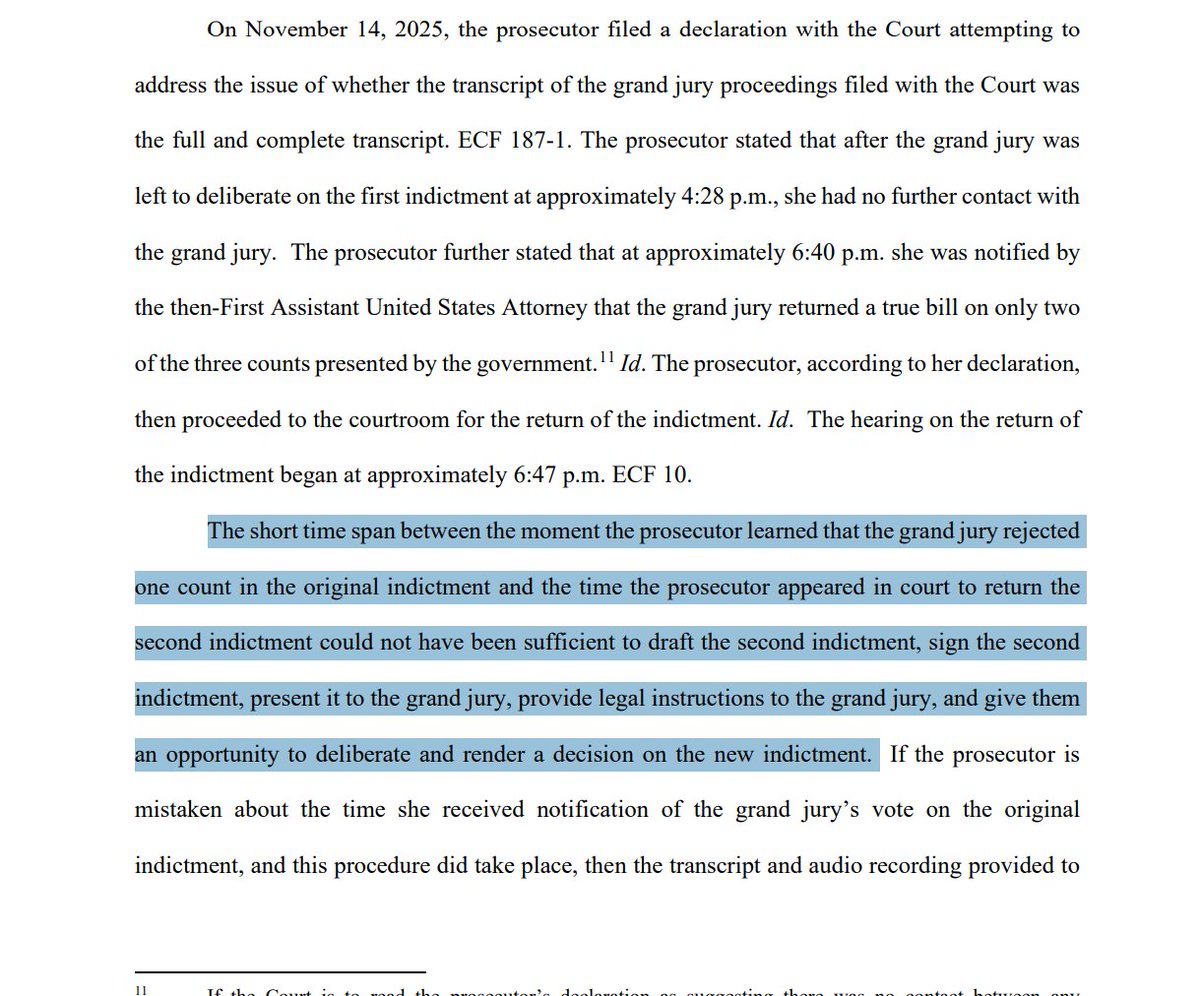
The First Assistant prosecutor was, I think, Maggie Cleary.
She was removed from the office on the same day Rule 16 discovery was due, and prosecutors filed for the filter team to deal with the privileged communications.
cnn.com/2025/10/13/pol…

She was removed from the office on the same day Rule 16 discovery was due, and prosecutors filed for the filter team to deal with the privileged communications.
cnn.com/2025/10/13/pol…
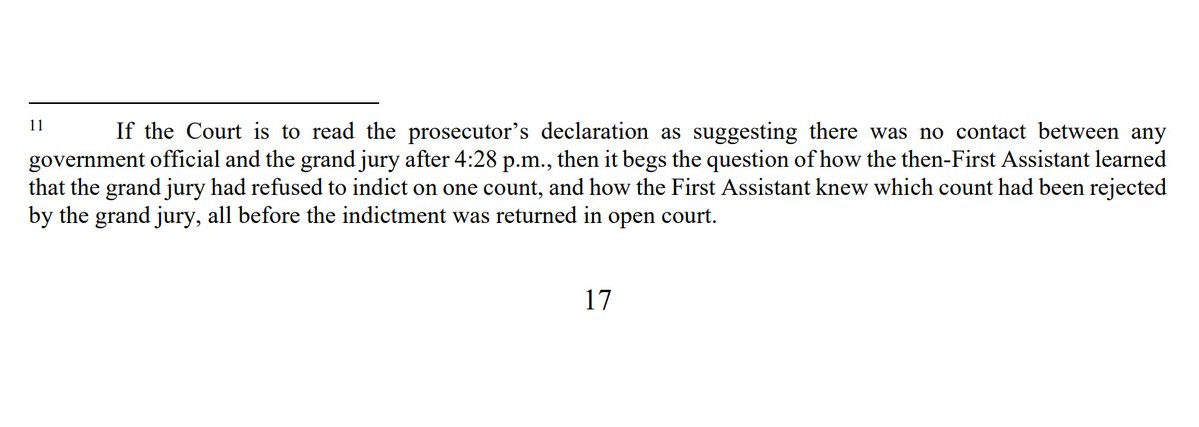
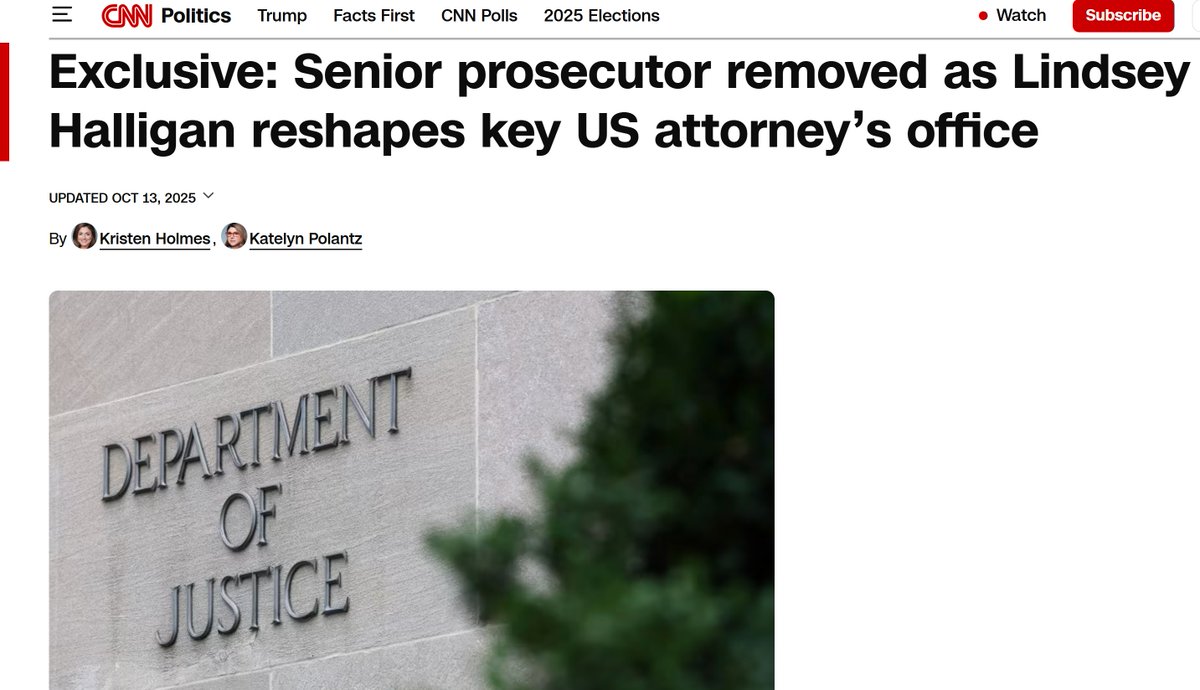
[String of expletives]
"If this procedure did not take place, then the Court is in uncharted legal territory in that the indictment returned in open court was not the same charging document presented to and deliberated upon by the grand jury."
"If this procedure did not take place, then the Court is in uncharted legal territory in that the indictment returned in open court was not the same charging document presented to and deliberated upon by the grand jury."
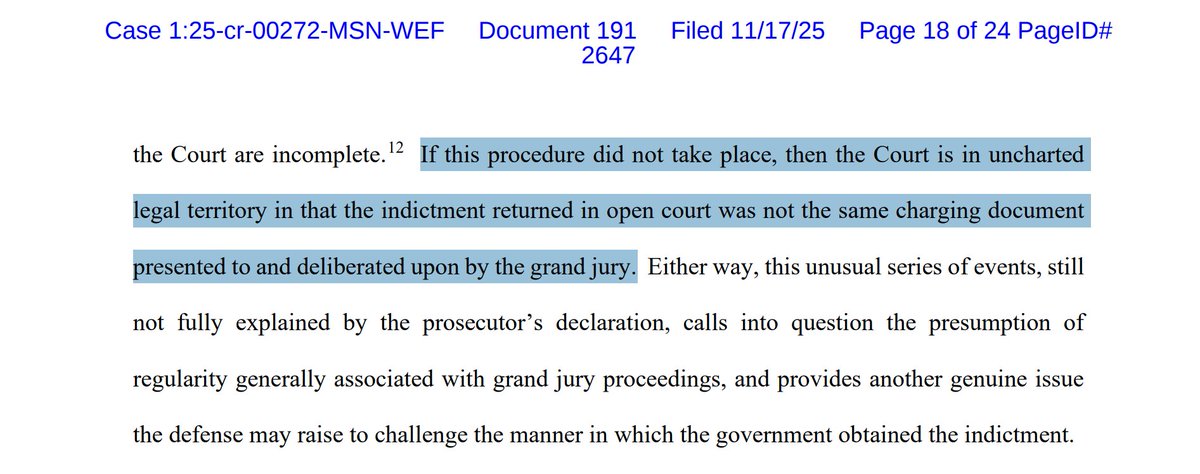
"when prosecutorial misconduct before the grand jury prejudices a defendant and threatens the defendant’s right to fundamental fairness in the criminal process, a district court may exercise its supervisory authority to dismiss the indictment." 
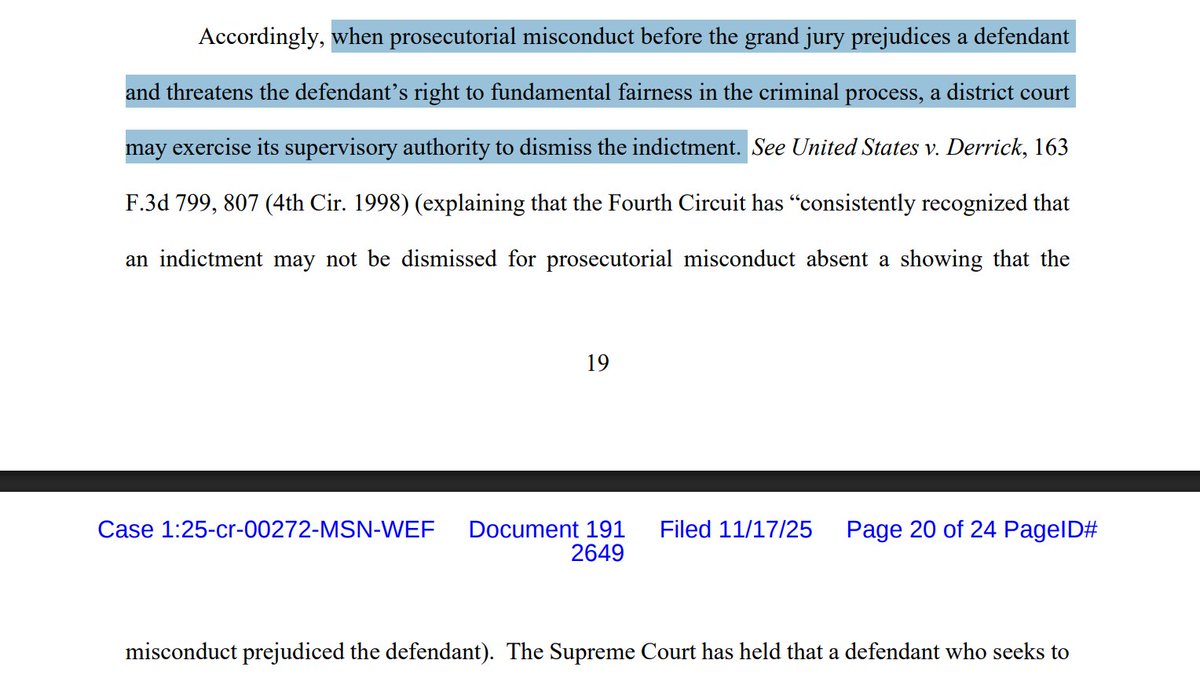
"Here, the procedural and substantive irregularities that occurred before the grand jury, and the manner in which evidence presented to the grand jury was collected and used, may rise to the level of government misconduct resulting in prejudice to Mr. Comey." 
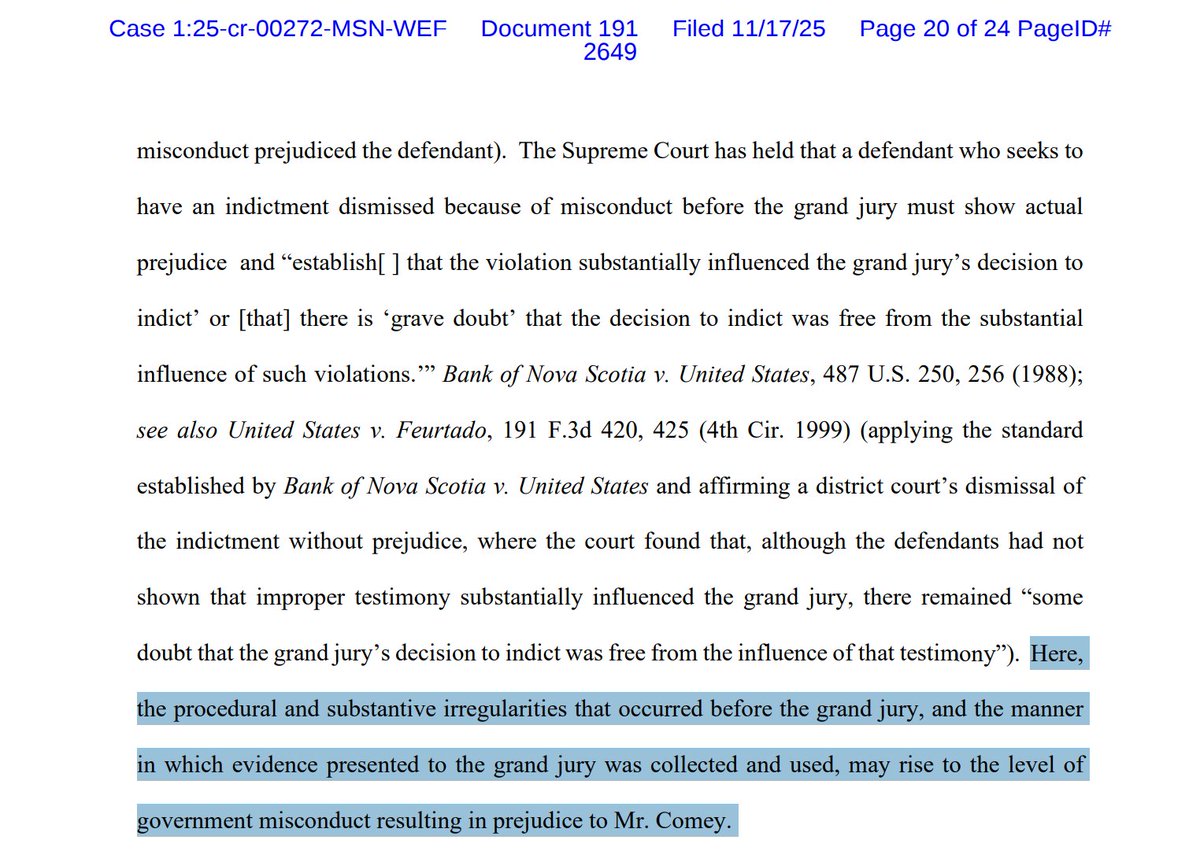
Ten Findings and a Conclusion.
"Collectively, the facts set forth herein and the particularized findings of the Court establish that “ground[s] may exist to dismiss the indictment because of a matter that occurred before the grand jury[.]” Rule 6(e)(3)(E)(ii). The Court need not now determine whether any facts herein have been proven, or whether there is merit to any motion yet to be filed. That task may lie ahead. Rather, the Court is finding that the government’s actions in this case–whether purposeful, reckless, or negligent–raise genuine issues of misconduct, are inextricably linked to the government’s grand jury presentation, and deserve to be fully explored by the defense."


"Collectively, the facts set forth herein and the particularized findings of the Court establish that “ground[s] may exist to dismiss the indictment because of a matter that occurred before the grand jury[.]” Rule 6(e)(3)(E)(ii). The Court need not now determine whether any facts herein have been proven, or whether there is merit to any motion yet to be filed. That task may lie ahead. Rather, the Court is finding that the government’s actions in this case–whether purposeful, reckless, or negligent–raise genuine issues of misconduct, are inextricably linked to the government’s grand jury presentation, and deserve to be fully explored by the defense."
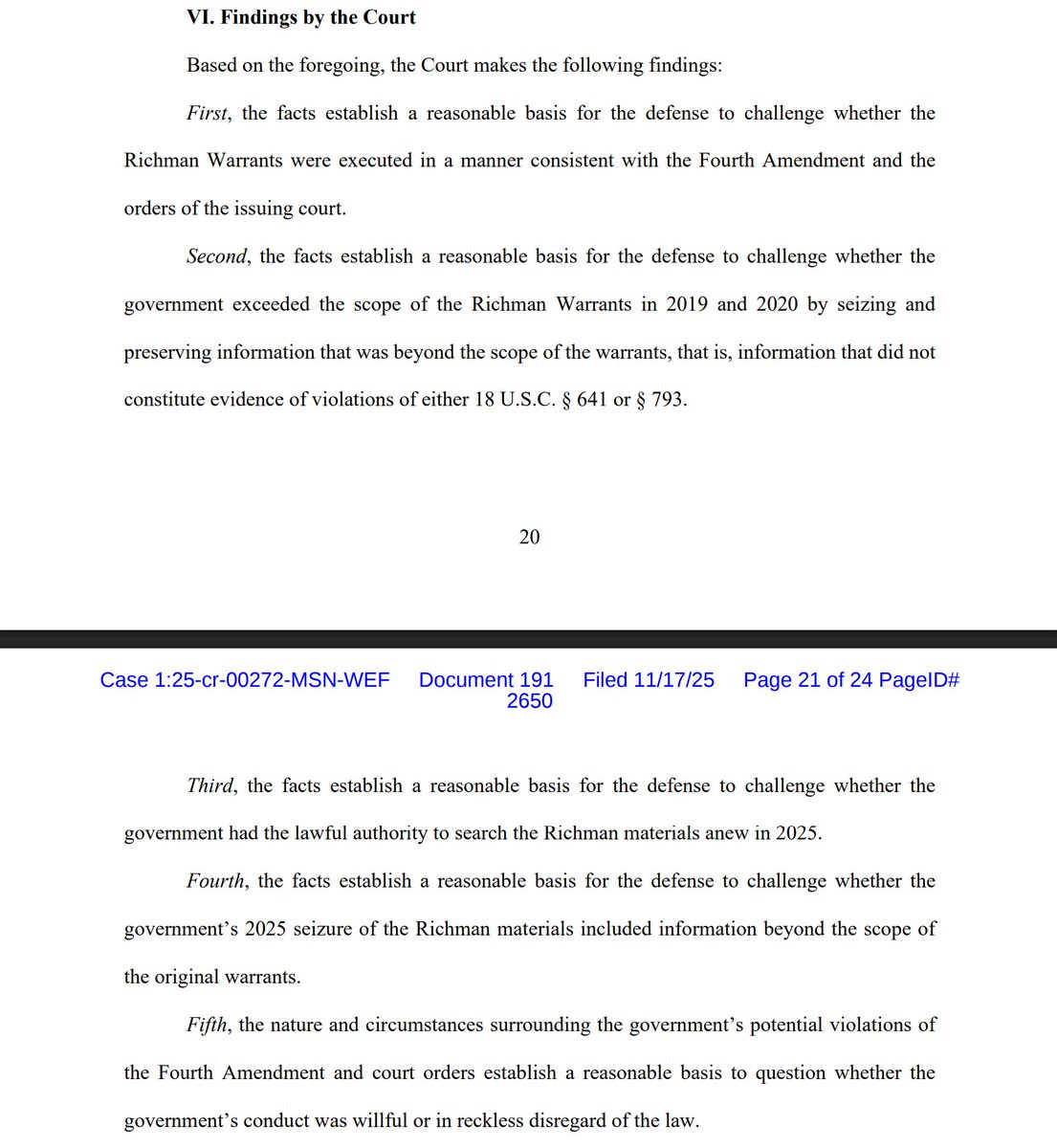
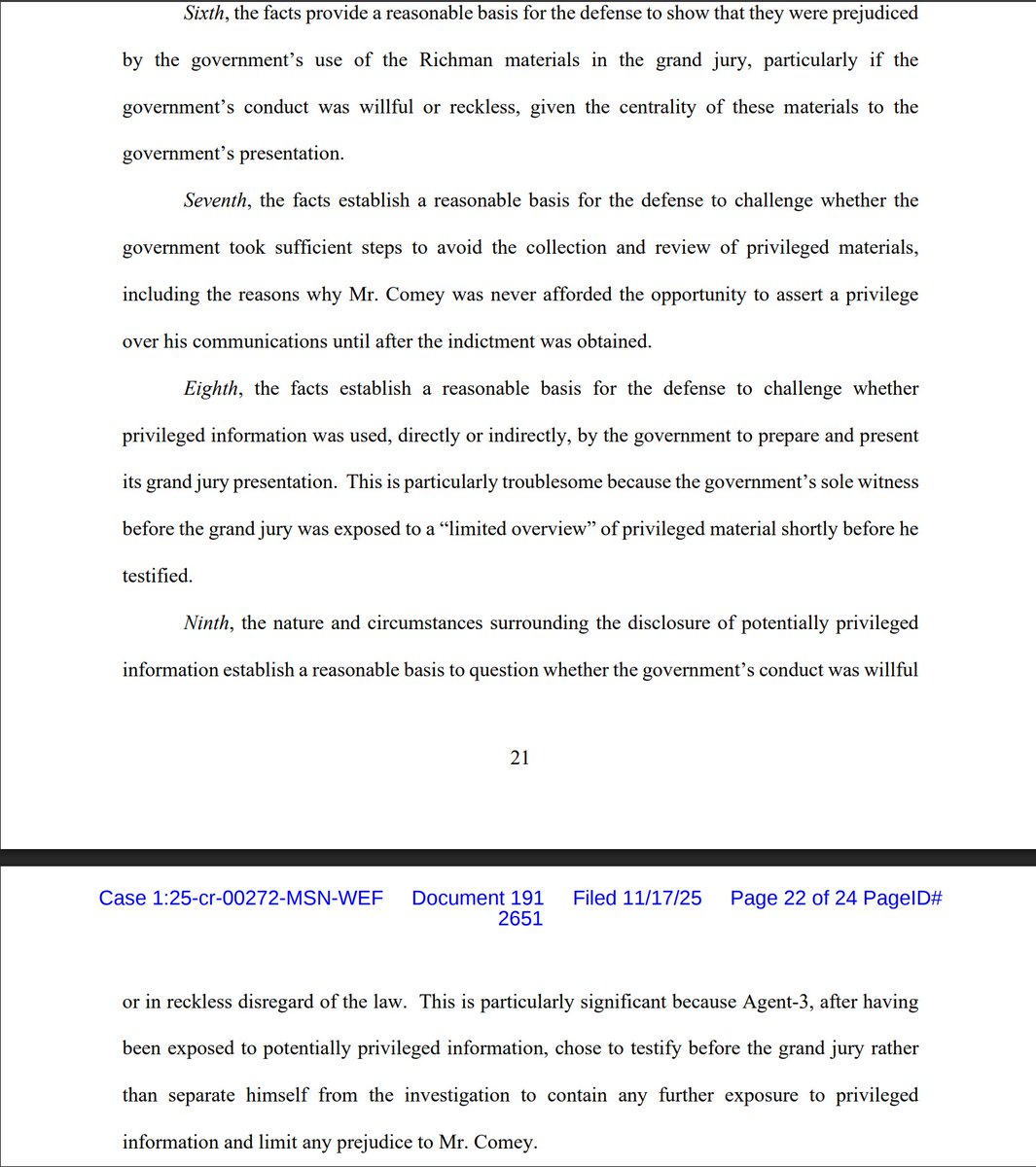
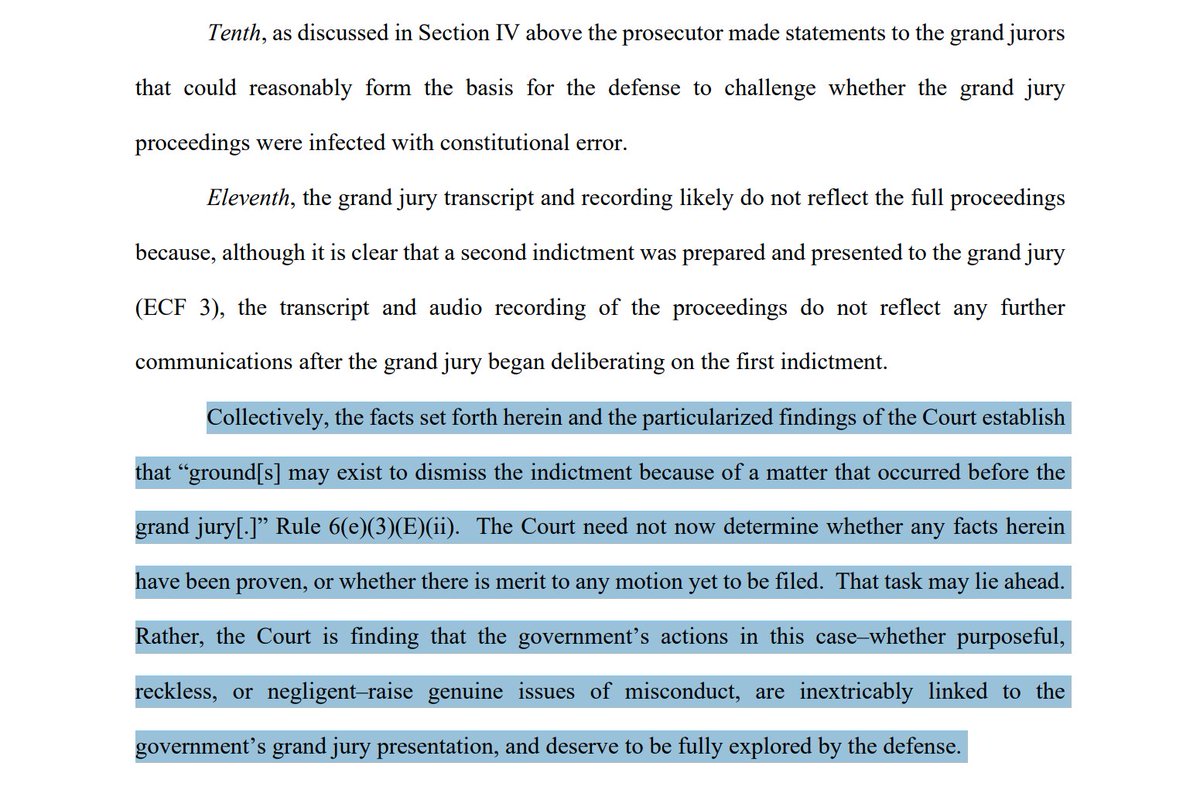
"the record points to a disturbing pattern of profound investigative missteps, missteps that led an FBI agent and a prosecutor to potentially undermine the integrity of the grand jury proceeding. Therefore, in this case, “the Court has before it a rare example of a criminal defendant who can actually make a ‘particularized and factually based’ showing that grounds exist to support the proposition that irregularities may have occurred in the grand jury proceedings and may justify the dismissal of one or more counts of the indictment.”"
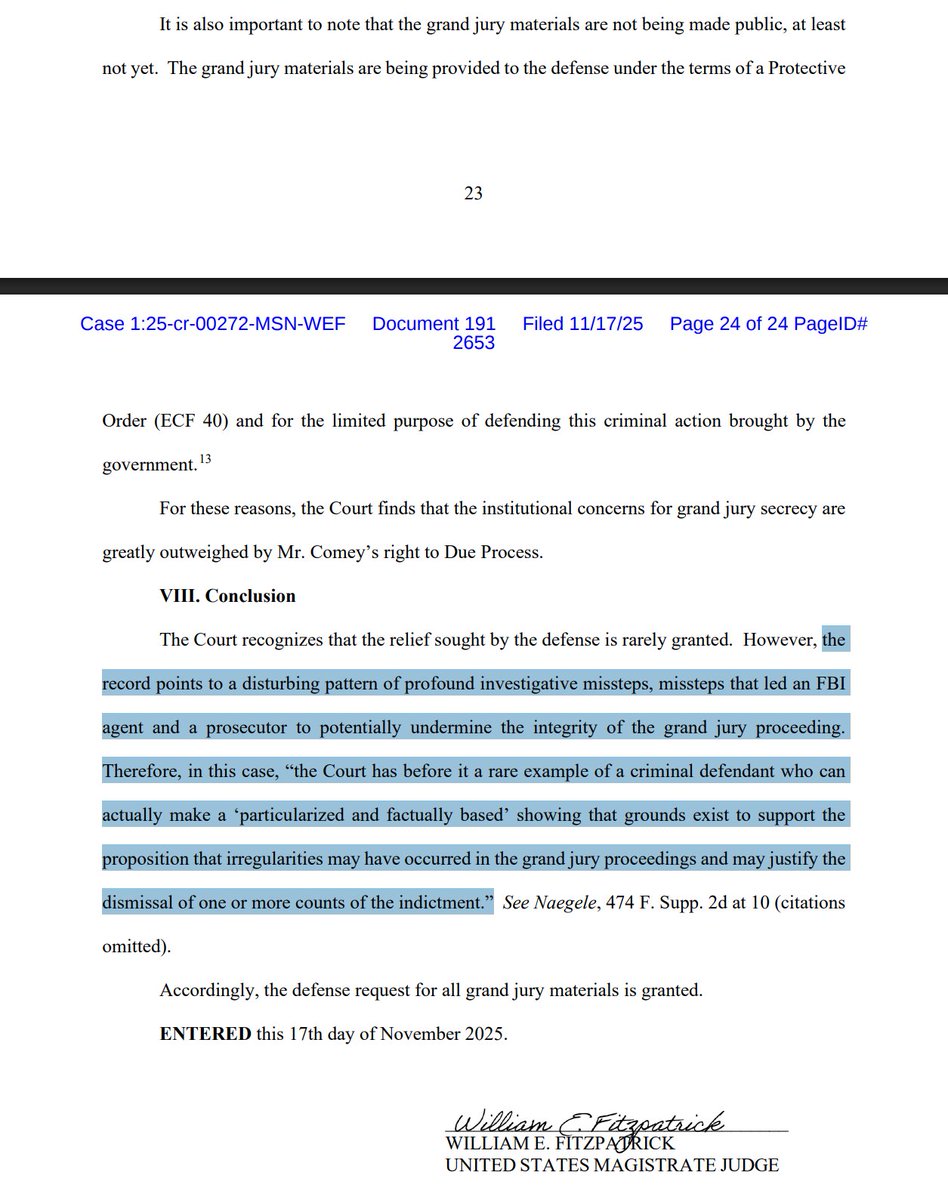
Memorandum and Opinion
storage.courtlistener.com/recap/gov.usco…
Order
storage.courtlistener.com/recap/gov.usco…
storage.courtlistener.com/recap/gov.usco…
Order
storage.courtlistener.com/recap/gov.usco…
I can't wait to discuss this filing and other updates in the Comey case in upcoming videos and podcast episodes!
Thanks for reading.
My links are here
linktr.ee/just_human
Thanks for reading.
My links are here
linktr.ee/just_human
• • •
Missing some Tweet in this thread? You can try to
force a refresh

